英语句子翻译练习(附答案)之欧阳语创编
My dad 绘本(英文加翻译)之欧阳语创编
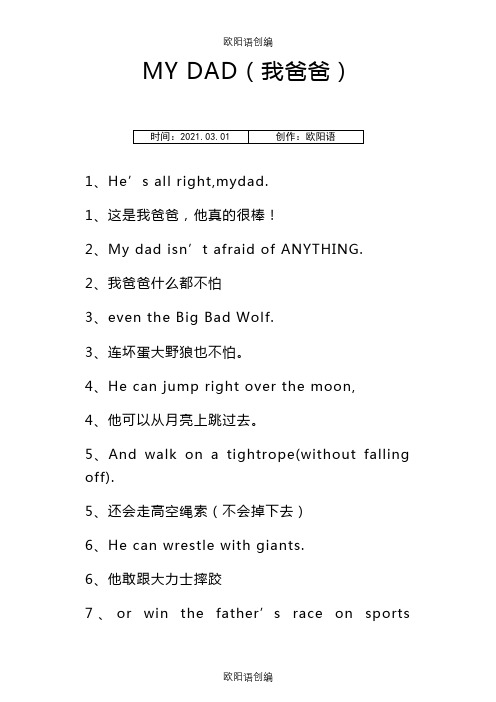
MY DAD(我爸爸)1、He’s all right,mydad.1、这是我爸爸,他真的很棒!2、My dad isn’t afraid of ANYTHING.2、我爸爸什么都不怕3、even the Big Bad Wolf.3、连坏蛋大野狼也不怕。
4、He can jump right over the moon,4、他可以从月亮上跳过去。
5、And walk on a tightrope(without falling off).5、还会走高空绳索(不会掉下去)6、He can wrestle with giants.6、他敢跟大力士摔跤7、or win the father’s race on sportsday,easily.7、在运动会比赛中,轻轻松松就获得了第一名。
8、He’s all right, my dad.8、我爸爸真的很棒!9、My dad can eat like a house,9、我爸爸吃得像马一样多10、and he can swim like a fish.10、我爸爸游得和鱼一样快。
11、He’s as strong as a gorilla,11、他像大猩猩一样强壮。
12、And as happy as a hippopotamus.12、也像河马一样快乐13、He’s all right, my dad.13、我爸爸真的很棒!14、My dad’s as a house,14、我爸爸想房子一样高大15、and as soft as my teddy.15、有时又像泰迪熊一样柔软16、He’s as wise as an owl,16、他像猫头鹰一样聪明。
17、except when he tries to help.17、有时又会做一些傻事。
18、He’s all right, my dad.18、我爸爸真的很棒!19、My dad’s a great dancer,19、我爸爸是个伟大的舞蹈家。
研究生英语阅读教程(基础级)第三次修订版课文参考译文之欧阳语创编
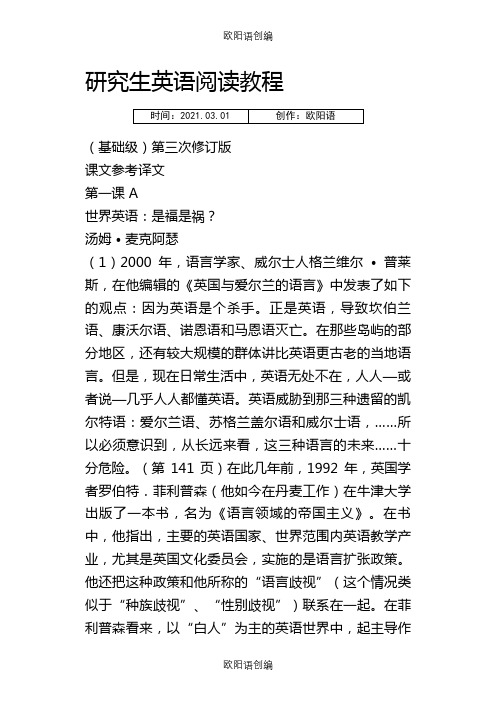
研究生英语阅读教程(基础级)第三次修订版课文参考译文第一课 A世界英语:是福是祸?汤姆•麦克阿瑟(1)2000 年,语言学家、威尔士人格兰维尔•普莱斯,在他编辑的《英国与爱尔兰的语言》中发表了如下的观点:因为英语是个杀手。
正是英语,导致坎伯兰语、康沃尔语、诺恩语和马恩语灭亡。
在那些岛屿的部分地区,还有较大规模的群体讲比英语更古老的当地语言。
但是,现在日常生活中,英语无处不在,人人—或者说—几乎人人都懂英语。
英语威胁到那三种遗留的凯尔特语:爱尔兰语、苏格兰盖尔语和威尔士语,……所以必须意识到,从长远来看,这三种语言的未来……十分危险。
(第141 页)在此几年前,1992 年,英国学者罗伯特.菲利普森(他如今在丹麦工作)在牛津大学出版了一本书,名为《语言领域的帝国主义》。
在书中,他指出,主要的英语国家、世界范围内英语教学产业,尤其是英国文化委员会,实施的是语言扩张政策。
他还把这种政策和他所称的“语言歧视”(这个情况类似于“种族歧视”、“性别歧视”)联系在一起。
在菲利普森看来,以“白人”为主的英语世界中,起主导作用的机构和个人,或故意或无意,鼓励或者至少容忍英语大肆扩张,他们当然不反对英语的扩张。
英语的扩张开始于大约三个世纪以前,最初表现形式是经济与殖民扩张。
(2)菲利普森本人为英国文化委员会工作过几年。
和他一样,还有一些母语为英语的学者,也试图强调英语作为世界语言的危险。
在过去几十年里,人们从三个群体的角度,就英语的国际化进行了广泛的讨论。
第一个群体是ENL 国家,英语是母语(这个群体也叫“内部圈”);第二个群体是ESL 国家,英语是第二语言(“外部圈”);第三个群体是EFL 国家,英语是外语(“扩展圈”)。
二十世纪八十年代,这些词语开始流行。
从那时起,这第三圈实际上已扩展到全球范围。
(3)从来没有像英语这样?语言,这既有利也有弊。
曾经有许多“世界语言”,例如:阿拉伯语、汉语、希腊语、拉丁语和梵语。
至考研阅读理解真题及翻译答案之欧阳语创编
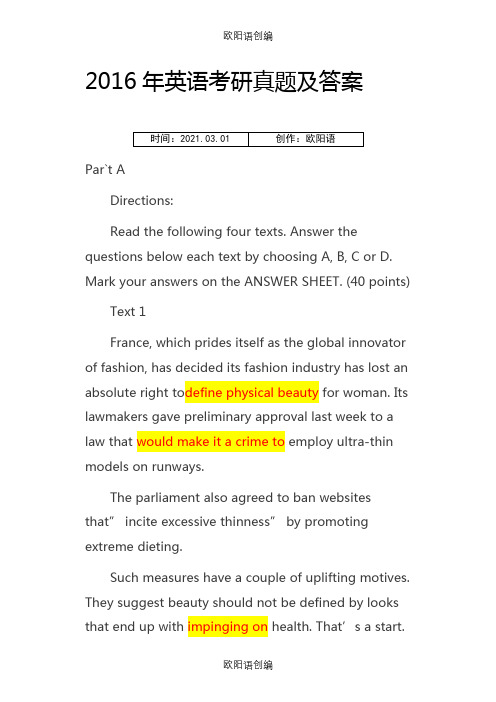
2016年英语考研真题及答案Par`t ADirections:Read the following four texts. Answer the questions below each text by choosing A, B, C or D. Mark your answers on the ANSWER SHEET. (40 points) Text 1France, which prides itself as the global innovator of fashion, has decided its fashion industry has lost an absolute right to define physical beauty for woman. Its lawmakers gave preliminary approval last week to a law that would make it a crime to employ ultra-thin models on runways.The parliament also agreed to ban websites that” incite excessive thinness” by promoting extreme dieting.Such measures have a couple of uplifting motives. They suggest beauty should not be defined by looks that end up with impinging on health. That’s a start.And the ban on ultra-thin models seems to go beyond protecting models from starring themselves to health –as some have done. It tells the fashion industry that it move take responsibility for the signal it sends women, especially teenage girls, about the social tape –measure they must use to determine their individual worth.The bans, if fully enforced ,would suggest to woman (and many men )that they should not let others be orbiters of their beauty .And perhaps faintly, they hint that people should look to intangible qualities like character and intellect rather than dieting their way to sine zero or wasp-waist physiques .The French measures, however, rely too much on severe punishment to change a culture that still regards beauty as skin-deep-and bone-showing. Under the law, using a fashion model that does not meet a government-defined index of body mess could result in a $85,000 fine and six months in prison.The fashion industry knows it has an inherent problem in focusing on material adornment andidealized body types. In Denmark, the United States, and a few other countries, it is trying to set voluntary standard for models and fashion images there rely more on pear pressure for enforcement.In contrast to France’s actions, Denmark’s fashion industry agreed last month on rules and sanctions regarding age, health, and other characteristics of models .The newly revised Danish Fashion Ethical charter clearly states, we are aware of and take responsibility for the impact the fashion industry has on body ideals, especially on young people. The charter’s main toll of enforcement is to deny access for designers and modeling agencies to Copenhagen. Fashion week, which is men by the Danish Fashion Institute .But in general it relies on a name-and –shame method of compliance.Relying on ethical persuasion rather than law to address the misuse of body ideals may be the best step. Even better would be to help elevate notions of beauty beyond the material standards of a particular industry.21. According to the first paragraph, what would happen in France?[A] Physical beauty would be redefined[B] New runways would be constructed[C] Websites about dieting would thrive[D] The fashion industry would decline22. The phrase “impinging on”(Line2 Para2) is closest in meaning to[A] heightening the value of[B] indicating the state of[C] losing faith in[D] doing harm to23. Which of the following is true of the fashion industry[A] The French measures have already failed[B] New standards are being set in Denmark[C] Models are no longer under peer pressure[D] Its inherent problems are getting worse24. A designer is most likely to be rejected by CFW for[A] setting perfect physical conditions[B] caring too much about models’ character[C] showing little concern for health factors[D] pursuing a high age threshold for models25. Which of the following maybe the best title of the text?[A] A challenge to the Fashion Industry’s Body Ideals[B] A Dilemma for the starving models in France[C] Just Another Round of struggle for beauty[D] The Great Threats to the Fashion IndustryText 2For the first time in the history more people live in towns than in the country. In Britain this has had a curious result. While polls show Britons rate “the countryside” alongside the royal family. Shakespeare and the National Health Service (NHS) as what makethem proudest of their country, this has limited political support.A century ago Octavia Hill launched the National Trust not to rescue stylish houses but to save “the beauty of natural places for everyone forever”. It was specifically to provide city dwellers with spaces for leisure where they could experience “a refreshing air”. Hill’s pressure later led to the creation of national parks and green belts. They don’t make countryside any more, and every year concrete consumes more of it .It needs constant guardianship.At the next election none of the big parties seem likely to endorse this sentiment. The Conservatives’planning reform explicitly gives rural development priority over conservation,even authorizing “off–plan” building where local people might object. The concept of sustainable development has been defined as profitable. Labour likewise wants to discontinue local planning where councils oppose development. The Liberal Democrats are silent only u sensing its chance, has sides with those pleading for a more considered approach tousing green land. Its campaign to protect Rural England struck terror into many local conservative parties.The sensible place to build new houses factories and offices is where people are in cities and towns where infrastructure is in place. The London agents Stirling Ackroyed recently identified enough sites for half of million houses in the Landon area alone with no intrusion on green belts. What is true of London is even truer of the provinces. The idea that “housing crisis” equals “concreted meadows” is pure lobby talk. The issue is not the need for more houses but, as always, where to put them under lobby pressure, George Osborne favours rural new-build against urban renovation and renewal. He favours out-of-town shopping sites against high streets. This is not a free market but a biased one. Rural towns and villages have grown and will always grow. They do so best where building sticks to their edges and respects their character. We do not ruin urban conservation areas. Why ruin rural ones?Development should be planned, not let trip, After the Netherlands, Britain is Europe’s mostcrowed country. Half a century of town and country planning has enable it to retain an enviable rural coherence, while still permitting low-density urban living. There is no doubt of the alternative-the corrupted landscapes of southern Portugal, Spain or Ireland. Avoiding this rather than promoting it should unite the left and right of the political spectrum.26. Britain’s public sentiment about the countryside[A] is not well reflected in politics[B] is fully backed by the royal family[C] didn’t start fill the Shakespearean age[D] has brought much benefit to the NHS27. According to paragraph 2,the achievements of the National Trust are now being[A] largely overshadowed[B] properly protected[C] effectively reinforced[D] gradually destroyed28. Which of the following can be offered from paragraph 3[A] Labour is under attack for opposing development[B] The Conservatives may abandon “off-plan”building[C] Ukip may gain from its support for rural conservation[D] The Liberal Democrats are losing political influence29. The author holds that George Osbornes’s preference[A] shows his disregard for the character of rural area[B] stresses the necessity of easing the housing crisis[C] highlights his firm stand against lobby pressure[D] reveals a strong prejudice against urban areas30. In the last paragraph the author show his appreciation of[A] the size of population in Britain[B] the enviable urban lifestyle in Britain[C] the town-and-country planning in Britain[D] the political life in today’s BritainText 3“There is one and only one social responsibility of business” wrote Milton Friedman, a Nobel Prize-winning economist “That is, to use its resources and engage in activities designed to increase its profits.”But even if you accept Friedman’s premise and regard corporate social responsibility(CSR) policies as a waste of shareholders’s money, things may not be absolutely clear-act. New research suggests that CSR may create monetary value for companies at least when they are prosecuted for corruption.The largest firms in America and Britain together spend more than $15 billion a year on CSR, according to an estimate by EPG, a consulting firm. This could add value to their businesses in three ways. First, consumers may take CSR spending as a “signal”that a company’s products are of high quality. Second, customers may be willing to buy acompany’s products as an indirect may to donate to the good causes it helps. And third, through a more diffuse “halo effect” whereby its good deeds earn it greater consideration from consumers and others.Previous studies on CSR have had trouble differentiating these effects because consumers can be affected by all three. A recent study attempts to separate them by looking at bribery prosecutions under American’s Foreign Corrupt Practices Act (FCPA).It argues that since prosecutors do not consume a company’s products as part of their investigations,they could be influenced only by the halo effect.The study found that,among prosecuted firms,those with the most comprehensive CSR programmes tended to get more lenient penalties. Their analysis ruled out the possibility that it was firm’s political influence, rather than their CSR stand, that accounted for the leniency: Companies that contributed more to political campaigns did not receive lower fines.In all, the study concludes that whereas prosecutors should only evaluate a case based on itsmerits, they do seem to be influenced by a company’s record in CSR. “We estimate that either eliminating a substantial labour-rights concern, such as child labour, or increasing corporate giving by about20% result in fines that generally are 40% lower than the typical punishment for bribing foreign officials.” says one researcher.Researchers admit that their study does not answer the question at how much businesses ought to spend on CSR. Nor does it reveal how much companies are banking on the halo effect, rather than the other possible benefits, when they companies get into trouble with the law, evidence of good character can win them a less costly punishment.31. The author views Milton Friedman’s statement about CSR with[A]uncertainty[B]skepticism[C]approval[D]tolerance32. According to Paragraph 2, CSR helps a company by[A]guarding it against malpractices[B]protecting it from consumers[C]winning trust from consumers.[D]raising the quality of its products33. The expression “more lenient”(line2,Para.4)is closest in meaning to[A]less controversial[B]more lasting[C]more effective[D]less severe34. When prosecutors evaluate a case, a company’s CSR record[A]comes across as reliable evidence[B]has an impact on their decision 对他们的决定有影响[C]increases the chance of being penalized[D]constitutes part of the investigation35. Which of the following is true of CSR according to the last paragraph?[A] The necessary amount of companies spending on it is unknown[B] Companies’ financial capacity for it has been overestimated[C] Its negative effects on businesses are often overlooked[D]It has brought much benefit to the banking industryText 4There will eventually come a day when The New York Times ceases to publish stories on newsprint. Exactly when that day will be is a matter of debate. ”Sometime in the future,” the paper’s publisher said back in 2010.Nostalgia for ink on paper and the rustle of pages aside, there’s plenty of incentive to ditch print. The infrastructure required to make a physical newspaper – printing presses, delivery trucks – isn’t just expensive; it’s excessive at a time when online – onlycompetitors don’t have the same set of financial constraints. Readers are migrating away from print anyway. And though print ad sales still dwarf their online and mobile counterparts, revenue from print is still declining.Overhead may be high and circulation lower, but rushing to eliminate its print edition would be a mistake, says BuzzFeed CEO Jonah Peretti.Peretti says the Times shouldn’t waste time getting out of the print business, but only if they go about doing it the right way. “Figuring out a way to accelerate that transition would make sense for them,” he said, “but if you discontinue it, you’re going have your most loyal customers really upset with you.”Sometimes that’s worth making a change anyway. Peretti gives the example of Netflix discontinuing its DVD-mailing service to focus on streaming. “It was seen as blunder,” he said. The move turned out to be foresighted. And if Peretti were in charge at the Times? ”I wouldn’t pick a yearto end print,” he said “I would raise prices and make it into more of a legacy product.”The most loyal customers would still get the product they favor, the idea goes, and they’d feel like they were helping sustain the quality of something they believe in. “So if you’re overpaying for print, you could feel like you were helping,”Peretti said. “Then increase it at a higher rate each year and essentially try to generate additional revenue.” In other words, if you’re going to make a print product, make it for the people who are already obsessed with it. Which may be what the Times is doing already. Getting the print edition seven days a week costs nearly $500 a year – more than twice as much as a digital – only subscription.“It’s a really hard thing to do and it’s a tremendous luxury that BuzzFeed doesn’t have a legacy business,” Peretti remarked. “But we’re going to have questions like that where we have things we’re doing that don’t make sense when the market changes and the world changes. In those situations, it’s better to be more aggressive that less aggressive.”36. The New York Times is considering ending it’s print edition partly due to[A] the increasing online and sales[B] the pressure from its investors[C] the complaints from its readers[D] the high cost of operation37. Peretti suggests that in face of the present situation, The Times should[A] make strategic adjustments[B] end the print sedition for good[C] seek new sources of leadership[D] aim for efficient management38. It can be inferred from paragraphs 5and 6 thata ” legacy product”[A] helps restore the glory of former times[B] is meant for the most loyal customers[C] will have the cost of printing reduced[D] expands the popularity of the paper39. Peretti believes that in a changing world[A] traditional luxuries can stay unaffected[B] cautiousness facilitates problem-solving[C] aggressiveness better meets challenges[D] legacy businesses are becoming out dated40. which of the following would be the best title of the text?[A] shift to online newspapers all at once[B] Cherish the Newspapers still in Your Hand[C] keep Your Newspapers Forever in Fashion[D] Make Your print Newspapers a luxury Good2015年考研英语(一)真题完整版Part ADirections:Read the following four texts. Answer the questions below each text by choosing A, B, C or D. Mark your answers on ANSWER SHEET. (40 points) Text 1King Juan Carlos of Spain once insisted “kings don’t abdicate, they dare in their sleep.” But embarrassing scandals and the popularity of therepublican left in the recent Euro-elections have forced him to eat his words and stand down. So, does the Spanish crisis suggest that monarchy is seeing its last days? Does that mean the writing is on the wall for all European royals, with their magnificent uniforms and majestic lifestyle?The Spanish case provides arguments both for and against monarchy. When public opinion is particularly polarised, as it was following the end of the Franco regime, monarchs can rise above “mere” politics and “embody” a spirit of national unity.It is this apparent transcendence of politics that explains monarchs’ continuing popularity polarized. And also, the Middle East excepted, Europe is the most monarch-infested region in the world, with 10 kingdoms (not counting Vatican City and Andorra). But unlike their absolutist counterparts in the Gulf and Asia, most royal families have survived because they allow voters to avoid the difficult search for a non-controversial but respected public figure.Even so, kings and queens undoubtedly have a downside. Symbolic of national unity as they claim tobe, their very history—and sometimes the way they behave today – embodies outdated and indefensible privileges and inequalities. At a time when Thomas Piketty and other economists are warning of rising inequality and the increasing power of inherited wealth, it is bizarre that wealthy aristocratic families should still be the symbolic heart of modern democratic states.The most successful monarchies strive to abandon or hide their old aristocratic ways. Princes and princesses have day-jobs and ride bicycles, not horses (or helicopters). Even so, these are wealthy families who party with the international 1%, and media intrusiveness makes it increasingly difficult to maintain the right image.While Europe’s monarchies will no doubt be smart enough to survive for some time to come, it is the British royals who have most to fear from the Spanish example.It is only the Queen who has preserved the monarchy’s reputation with her rather ordinary (if well-heeled) granny style. The danger will come withCharles, who has both an expensive taste of lifestyle and a pretty hierarchical view of the world. He has failed to understand that monarchies have largely survived because they provide a service – as non-controversial and non-political heads of state. Charles ought to know that as English history shows, it is kings, not republicans, who are the monarchy’s worst enemies.21. According to the first two Paragraphs, King Juan Carlos of Spain[A] used turn enjoy high public support[B] was unpopular among European royals[C] cased his relationship with his rivals[D]ended his reign in embarrassment22. Monarchs are kept as heads of state in Europe mostly[A] owing to their undoubted and respectable status[B] to achieve a balance between tradition and reality[C] to give voter more public figures to look up to[D]due to their everlasting political embodiment23. Which of the following is shown to be odd, according to Paragraph 4?[A] Aristocrats’ excessive reliance on inherited wealth[B] The role of the nobility in modern democracies[C] The simple lifestyle of the aristocratic families[D]The nobility’s adh erence to their privileges24. The British royals “have most to fear” because Charles[A] takes a rough line on political issues[B] fails to change his lifestyle as advised[C] takes republicans as his potential allies[D] fails to adapt himself to his future role25. Which of the following is the best title of the text?[A] Carlos, Glory and Disgrace Combined[B] Charles, Anxious to Succeed to the Throne[C] Carlos, a Lesson for All European Monarchs[D]Charles, Slow to React to the Coming ThreatsTEXT 2Just how much does the Constitution protect your digital data? The Supreme Cpurt will now consider whether police can search the contents of a mobile phone without a warrant if the phone is on or around a person during an arrest.California has asked the justices to refrain from a sweeping ruling, particularly one that upsets the old assumptions that authorities may search through the possessions of suspects at the time of their arrest. It is hard, the state argues, for judges to assess the implications of new and rapidly changing technologies.The court would be recklessly modest if it followed California’s advice. Enough of the implications are discernable, even obvious, so that the justice can and should provide updated guidelines to police, lawyers and defendants.They should start by discarding California’s lame argument that exploring the contents of a smartphone- a vast storehouse of digital information is similar to say, going through a suspect’spurse .The court has ruled that police don't violate the Fourth Amendment when they go through the wallet or porcketbook, of an arrestee without a warrant. But exploring one’s smartphone is more like entering his or her home. A smartphone may contain an arrestee’s reading history ,financ ial history, medical history and comprehensive records of recent correspondence. The development of “cloud computing.” meanwhile, has made that exploration so much the easier.But the justices should not swallow California’s argument whole. New, disruptive technology sometimes demands novel applications of the Constitution’s protections. Orin Kerr, a law professor, compares the explosion and accessibility of digital information in the 21st century with the establishment of automobile use as a digital necessity of life in the 20th: The justices had to specify novel rules for the new personal domain of the passenger car then; they must sort out how the Fourth Amendment applies to digital information now.26. The Supreme court, will work out whether, during an arrest, it is legitimate to[A] search for suspects’ mobile phones without a warrant.[B] check suspects’ phone contents without being authorized.[C] prevent suspects from deleting their phone contents.[D] prohibit suspects from using their mobile phones.27. The author’s attitude toward California’s argument is one of[A] tolerance.[B] indifference.[C] disapproval.[D] cautiousness.28. The author believes that exploring one’s phone content is comparable to[A] getting into one’s r esidence.[B] handing one’s historical records.[C] scanning one’s correspondences.[D] going through one’s wallet.29. In Paragraph 5 and 6, the author shows his concern that[A] principles are hard to be clearly expressed.[B] the court is giving police less room for action.[C] phones are used to store sensitive information.[D] citizens’ privacy is not effective protected.市民的隐私没有被好好的保护30.Orin Kerr’s comparison is quoted to indicate that(A)the Constitution should be implemented flexibly.(B)New technology requires reinterpretation of the Constitution.(C)California’s argument violates principles of the Constitution.(D)Principles of the Constitution should never be altered.Text 3The journal Science is adding an extra round of statistical checks to its peer-review process, editor-in-chief Marcia McNutt announced today. The policyfollows similar efforts from other journals, after widespread concern that basic mistakes in data analysis are contributing to the irreproducibility of many published research findings.“Readers must have confidence in the conclusions published in our journal,” writes McNutt in an editorial. Working with the American Statistical Association, the journal has appointed seven experts to a statistics board of reviewing editors (SBoRE). Manu will be flagged up for additional scrutiny by the journal’s internal editors, or by its existing Board of Reviewing Editors or by outside peer reviewers. The SBoRE panel will then find external statisticians to review these manus.Asked whether any particular papers had impelled the change, McNutt said: “The creation of the‘statistics board’ was motivated by concerns broadly with the application of statistics and data analysis in scientific research and is part of Science’s overall drive to increase reproducibility in the research we publish.”Giovanni Parmigiani, a biostatistician at the Harvard School of Public Health, a member of theSBoRE group, says he expects the board to “play primarily an advisory role.” He agreed to join because he “found the foresight behind the establishment of the SBoRE to be novel, unique and likely to have a lasting impact. This impact will not be through the publications in Science itself, but hopefully through a larger group of publishing places that may want to model their approach after Science.”31、It can be learned from Paragraph I that[A] Science intends to simplify its peer-review process.[B]journals are strengthening their statistical checks.[C]few journals are blamed for mistakes in data analysis.[D]lack of data analysis is common in research projects.32、The phrase “flagged up”(Para.2)is the closest in meaning to[A]found.[B]revised.[C]marked[D]stored33、Giovanni Parmigiani believes that the establishment of the SBoRE may[A]pose a threat to all its peers[B]meet with strong opposition[C]increase Science’s circulation.[D]set an example for other journals 对其他旅行者做榜样34、David Vaux holds that what Science is doing nowA. adds to researchers’ worklosd.B. diminishes the role of reviewers.C. has room for further improvement.D. is to fail in the foreseeable future.35. Which of the following is the best title of the text?A. Science Joins Push to Screen Statistics in PapersB. Professional Statisticians Deserve More RespectC. Data Analysis Finds Its Way onto Editors’DesksD. Statisticians Are Coming Back with ScienceText 4Two years ago, Rupert Murdoch’s daughter, Elisabeth, spoke of the “unsettling dearth of integrityacross so many of our institutions”. Integrity had collapsed, she argued, because of a collective acceptance that the only “sorting mechanism” in society should be profit and the market. But “it’s us, human beings, we the people who create the society we want, not profit”.Driving her point home, she continued: “It’s increasingly apparent that the absence of purpose, of a moral language within government, media or business could become one of the most dangerous goals for capitalism and freedom.” This same absence of moral purpose was wounding companies such as News International, she thought, making it more likely that it would lose its way as it had with widespread illegal telephone hacking.As the hacking trial concludes—finding guilty one ex-editor of the News of the World, Andy Coulson, for conspiring to hack phones, and finding his predecessor, Rebekah Brooks, innocent of the same charge—the wider issue of dearth of integrity still stands. Journalists are known to have hacked the phones of up to 5,500 people. This is hacking on an industrial scale, as was acknowledged by GlennMulcaire, the man hired by the News of the World in 2001 to be the point person for phone hacking. Others await trial. This saga still unfolds.In many respects, the dearth of moral purpose frames not only the fact of such widespread phone hacking but the terms on which the trial took place. One of the astonishing revelations was how little Rebekah Brooks knew of what went on in her newsroom, how little she thought to ask and the fact that she never inquired how the stories arrived. The core of her successful defence was that she knew nothing.In today’s world, it has become normal that well-paid executives should not be accountable for what happens in the organisations that they run. Perhaps we should not be so surprised. For a generation, the collective doctrine has been that the sorting mechanism of society should be profit. The words that have mattered are efficiency, flexibility, shareholder value, business-friendly, wealth generation, sales, impact and, in newspapers, circulation. Words degraded to the margin have been。
大学英语精读第二册课后习题答案之欧阳语创编
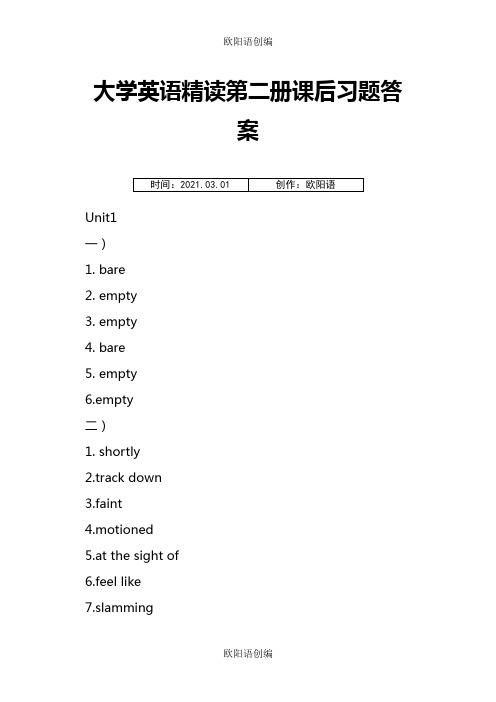
大学英语精读第二册课后习题答案Unit1一)1. bare2. empty3. empty4. bare5. empty6.empty二)1. shortly2.track down3.faint4.motioned5.at the sight of6.feel like7.slamming8.rang out9.contract10.made for11.heated12.emerged三)1. host2. sprang up/rang out3. impulse4. came to5. track down6. unexpected7. outgrow8. widened9. shortly10. emerge / spring up11. at the sight of12. made for13. crisis14. colonial四)1. Jimmy has outgrown the shirts his aunt made forhim a few years ago.2. Does the doctor think the elderly lady is likely to survive the operation / it is likely that the elderly lady will survive the operation?3. The other day your cousin paid us an unexpected visit.4. Don't you see the nurse motioning us to be silent?5. Her face lit up with joy at his return.6. The sound of her footsteps grew fainter as she walked farther away.五)1.Additional advantageousAnxious conditionalCourageous curiousDangerous educationalEmotional famousIndustrial intentionalMedical mountionousMusical mysteriousNational occasionalPersonal practical2.Heated coloredpigtailed giftedbearded pointedexperienced agedskilled diseased六)1.The people questioned gave very different opinions on the issue.2. Can you see the man climbing on that rock?3. Several days passed before they came up with a satisfactory solution to the problems discussed.4. We were woken early by the sound of the birds singing.5. The chairman made it clear that those objecting should explain their reasons.6. After a day’s work, I felt I had little energy left.7. I knew of some of the athletes taking part.8. The success obtained surprised those who had given up the project as impossible.七)1. During the time that2. As long as3. Although4. as long as5. whereas6. Although7. whereas8. Although1. They frightened the child into telling the truth.2. He tricked her into marrying him by pretending that he was the son of a millionaire.3. My tactless words forced the old gentleman into buying something he could not possibly afford.4. He finally talked me into accepting his terms.5. The girl persuaded her father into giving up smoking.6. Their severe criticism shocked her into realizing her selfishness.1. Guests are to be back in the hotel by twelve o’clock.2. An investigation is to be made next week.3. I am to meet them at the airport.4. You are to finish your homework before you watch TV.5. The medicine is to be taken three times a day after meals.6. Bob and Susan are to get married in October八)1.hosts2.heated3.argument4.impulse5.shortly6.emerged7.slam8.crawled9.crisis1.corner2.attention3.noticed4.shining5.directed6.there7.bed8.snake9.its10.feet11.from12.however13.do14.as15.forward16.neither17.still18.if19.through20.floor21.pulling22.under23.cried24.out25.to26.where27.made28.eyes九)1.do the cooking 3.hardly thought so3.settled down4.half expected5.equipment6.boiled over7.why things were so quiet8.burning9.greeted10.battlefield十)1.她砰地关上门,一声不吭地走了,他们之间那场争执就此结束。
新概念英语第一册(教师用书)之欧阳语创编
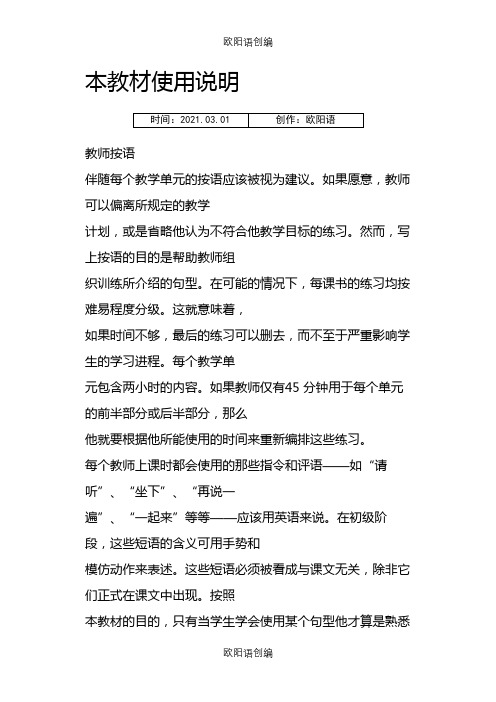
本教材使用说明教师按语伴随每个教学单元的按语应该被视为建议。
如果愿意,教师可以偏离所规定的教学计划,或是省略他认为不符合他教学目标的练习。
然而,写上按语的目的是帮助教师组织训练所介绍的句型。
在可能的情况下,每课书的练习均按难易程度分级。
这就意味着,如果时间不够,最后的练习可以删去,而不至于严重影响学生的学习进程。
每个教学单元包含两小时的内容。
如果教师仅有45 分钟用于每个单元的前半部分或后半部分,那么他就要根据他所能使用的时间来重新编排这些练习。
每个教师上课时都会使用的那些指令和评语——如“请听”、“坐下”、“再说一遍”、“一起来”等等——应该用英语来说。
在初级阶段,这些短语的含义可用手势和模仿动作来表述。
这些短语必须被看成与课文无关,除非它们正式在课文中出现。
按照本教材的目的,只有当学生学会使用某个句型他才算是熟悉了这一句型。
这就是为什么课堂教学中常用的指令并没有列入教师用书课文之前的句型和词汇表内。
按语分列在不同的标题之下。
现在我们来介绍其中的每一项。
内容和基本目标——总体评论这两个标题下的内容简要地归纳了课文所教的句型和语项。
归纳完全是为教师准备的。
听力理解详尽的指令在课程之初便作了交代,但随着教师慢慢适应这一程序,指令便逐渐简化。
我们推荐介绍课文的9 个步骤,用以训练学生听懂英语口语的能力。
这9 个步骤如下:1 介绍故事2 了解情景3 听力训练目标4 播放录音或朗读课文5 回答问题6 精读7 再次播放录音或朗读课文8 重复9 大声朗读每一个步骤都必须简洁。
让我们来看一下如何在实践中运用这9 个步骤:1 介绍故事教师用几句话介绍课文,使学生能清楚了解所发生的事情,而不需要去猜测。
开始可以用少量的中文,但教师必须尽早开始用英语。
例如:Today we'll listen to a storyabout a handbag.(今天,我们要听一个有关手提包的故事。
)2 了解情景要求学生看插图,以便检查学生是否了解课文中所发生的事情。
新概念第一册 Lesson 103-104 课堂及课后练习之欧阳语创编
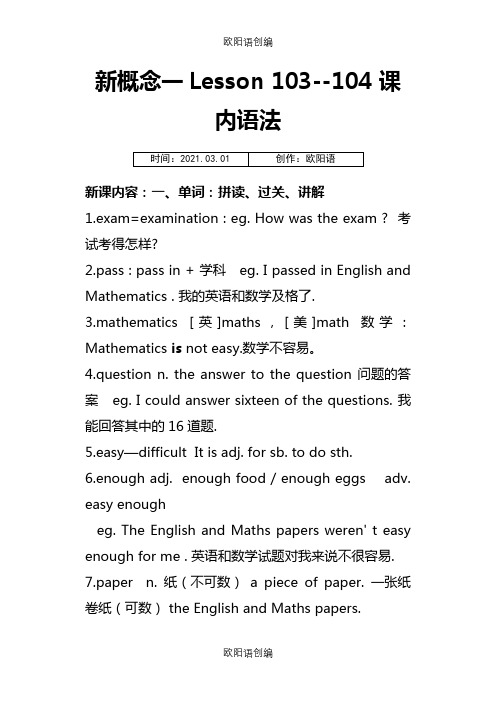
新概念一Lesson 103--104 课内语法新课内容:一、单词:拼读、过关、讲解1.exam=examination : eg. How was the exam ? 考试考得怎样?2.pass : pass in + 学科 eg. I passed in English and Mathematics . 我的英语和数学及格了.3.mathematics [英]maths,[美]math 数学:Mathematics is not easy.数学不容易。
4.question n. the answer to the question 问题的答案 eg. I could answer sixteen of the questions. 我能回答其中的16道题.5.easy—difficult It is adj. for sb. to do sth.6.enough adj. enough food / enough eggs adv. easy enougheg. The English and Maths papers weren' t easy enough for me . 英语和数学试题对我来说不很容易. 7.paper n. 纸(不可数)a piece of paper. 一张纸卷纸(可数) the English and Maths papers.8.fail ([反]succeed 失败;不及格:Your plans failed.你们的计划不成功。
9.look at…for+时间段看一看... (看了多久)二、词组1、试题 exam questions2、通过某一科考试pass in3、对某人来说太怎么样be too + adj. +forsb.4、别灰心cheer up5、临近、贴近next to6、在上部 at the top of7、写字 write words 8、三次three times三、语法1、how was/were /is /are… ? 怎么样?(用来征求他人意见或询问情况) eg: How was your vacation ? 你的假期怎么样?2、how about…? …怎么样?eg: How aboutgoing for a walk? 出去散步怎么样?3、 too 与enough 的用法⑴ enough 的用法A 在形容词之后使用eg: He failed the exam because it wasn' t easy enough .B 在名词之前使用eg: He didn’t buy the car because he didn' t have enough money.C 可用在 enough … for sb /sth 和enough …to do sth 结构之中eg: This dress isn' t big enough for her . She is not old enough to live alone.⑵too A too 表示“太…” eg: I can' t go out. It' s too hot.B 可用在 too … for sb/sth 结构之中 eg: It' s too easy for me .C 可以用在 too … to do sth. 结构之中 eg: The exam was too difficult for him to pass.一、单词连线exam 问题 pass 振作、振奋mathematics 其他的东西 answer 困难的question 家伙、人 hate 未及格、失败paper 分数 cheer 及格、通过mark 上方、顶部 fail 容易的rest 卷纸 difficult 足够的guy 考试 enough 讨厌top 数学 easy 回答二、选择1 Is your little sister old to go to school ? A tooB enoughC veryD quite2 The questions were difficult for me answer.A enough , toB very , toC much , toD too ,to3 I think I passed English and maths. A in B forC atD with4 Please write your name the top of the paper . Ain B at C on D for5 I sat there and looked my papers two hours. Aat , for B for , at C for , in D at ,after新概念一Lesson103-104课前测试一、单词:1.及格,通过2.问题3.容易的4.未及格,失败5.回答6.振奋,振作7.其他的东西8.家伙9.考卷10.讨厌11.缺席的(L67)二、词组1.通过某一科考试2.振奋起来3.邻近、贴近4.在卷子的顶端5.我确信6.对某人来说太难了三、单项选择1.I sat there and looked ______ my papers______ two hours.A.at, forB.for, atC.for, inD.at, after2.The English papers weren't easy______________ him.A.inB.atC.onD.for3.Is your little sister old__________ to go to school?A.tooB.enoughC.veryD.quite4.Please write your name______________ the top of the paper.A.inB.atC.onD.for5.The questions were _______difficult for me_________ answer.A.enough, toB.very, toC.much, toD.too, to6.The teacher__________ me is an English teacher.A.next inB.next toC.next forD.next on7.Perhaps I didn't __________ too____________.A.did, badlyB.do, badC.do, badlyD.did, bad8.Mathematics______________ difficult for me.A.beingB.isC.beD.are9.How are you?----______________.A.Fine, thanksB.GoodC.I'm elevenD.Yes,I am.10.I think I passed______________ English and maths.A.inB.forC.atD.with四、将下列句子改为反意疑问句1.Tom is a student,______________?2.She's had her lunch,______________?3.You'd better go to see your sister,______________?4.Let's go to school,______________?5.He hurt his foot yesterday,______________?五、翻译句子1.考试考的怎么样?2.或许我们考的还不太糟.3.但我回答不出其余的题。
仁爱英语九年级上册Unit1-Unit2课文翻译之欧阳语创编
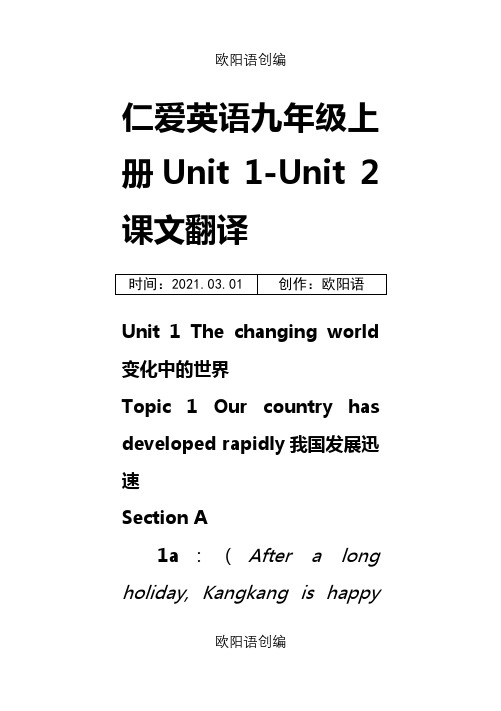
仁爱英语九年级上册Unit 1-Unit 2课文翻译Unit 1 The changing world 变化中的世界Topic 1 Our country has developed rapidly我国发展迅速Section A1a:(After a long holiday, Kangkang is happy欧阳语创编to see his friends.)(长假过后,康康很高兴会见到他的朋友们。
)Hi, Jane! Did you have a good summer holiday?你好,简,你暑假过得愉快吗?Yes. What about you?是的,你呢?Not bad. Rita, you have just come back from your hometown. How was your trip?不错。
丽塔,你刚从家乡回来,你的旅行怎么样?Great! I went to many欧阳语创编places near my home in India. Great changes have taken place there and my hometown has become more and more beautiful. Where have you been, Jane? 好极了!在印度,我去了我家附近的很多地方。
那里发生了很大的变化,而且我的家乡变得越来越美丽了。
简,你去哪里了?I have been to Mount Huang with my parents. It's a beautiful place. But there were so many people that I欧阳语创编couldn't find a good place to take photos. And where have you been, Kangkang ? 我和我的父母去过黄山,那是一个美丽的地方。
小学四年级(上)英语练习题及参考答案之欧阳语创编

小学四年级英语练习题及参考答案一给下列单词选出正确的汉语(1*10)puter A 电视 B计算机 C灯2.window A 客户 B门 C墙3.many A 许多的 B 一些 C 一点4.music A音乐 B运动 C科学5.painting A 绘画 B 白纸C图画6.sports A 音乐B运动C科学7.hair A脸B马C头发8.pencil A 钢笔 B铅笔C圆珠笔9.twenty-one A二十一 B十二 C第二十一10.classroom A教室B 房间 C学校二问答连线(1*10)1 what’s in your schoolbag? A 50yuan2 what’colour is it? B she’s Amy3 how many books do you have? C A book4 how much is it? D red5 who’s she? EYes, I do6 what do you like? F thirty7. what’s his name? G I like music8 where’ my book? H his name is zhangpeng9 Do you like sports? I A boy10 boy or girl? J It’s on the desk三选择(2*15)1 Look! This is ____classroomA myB meC we2 What’s_____the classroomA inB onC near3 let_____clean the floorA isB weC us4 Look____the picture, It’niceA atB inC on5 What colour is your book? --------It’s____A a redB yellowC ten6 I____a new friendA hasB haveC am7 He___a boy. He ___short hairA is haveB is hasC has has8 Look! This is___photo. He is tallA He’sB herC his9 who’s_____best f riendA youB myC your10 _____is my seat? It’s near the doorA whoB whatC where11May I use your pen?Sure ___________A Here you areB you are hereC here are you12________English books can you see? TwentyA How manyB How much CWhat13 I____Music, my friend ____sportsA like likeB like likesC like likes14 He _____short hair and big eyesA HasB haveC is15where’s my pen?A Yes It isB It’s a penC It’s on the desk四阅读短文,判断对错。
英语双重否定句的几种常见句型之欧阳语创编
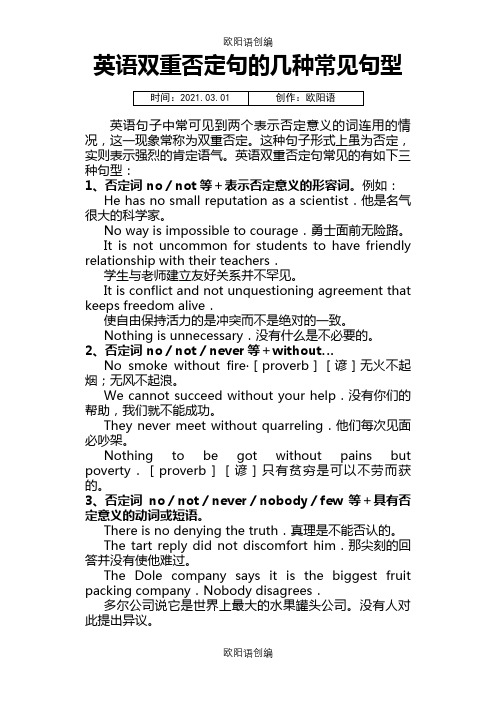
英语双重否定句的几种常见句型英语句子中常可见到两个表示否定意义的词连用的情况,这一现象常称为双重否定。
这种句子形式上虽为否定,实则表示强烈的肯定语气。
英语双重否定句常见的有如下三种句型:1、否定词 no/not等+表示否定意义的形容词。
例如:He has no small reputation as a scientist.他是名气很大的科学家。
No way is impossible to courage.勇士面前无险路。
It is not uncommon for students to have friendly relationship with their teachers.学生与老师建立友好关系并不罕见。
It is conflict and not unquestioning agreement that keeps freedom alive.使自由保持活力的是冲突而不是绝对的一致。
Nothing is unnecessary.没有什么是不必要的。
2、否定词 no/not/never等+without…No sm oke without fire·[proverb][谚]无火不起烟;无风不起浪。
We cannot succeed without your help.没有你们的帮助,我们就不能成功。
They never meet without quarreling.他们每次见面必吵架。
Nothing to be got without pains but poverty.[proverb][谚]只有贫穷是可以不劳而获的。
3、否定词no/not/never/nobody/few等+具有否定意义的动词或短语。
There is no denying the truth.真理是不能否认的。
The tart reply did not discomfort him.那尖刻的回答并没有使他难过。
三年级英语上册课文翻译之欧阳语创编
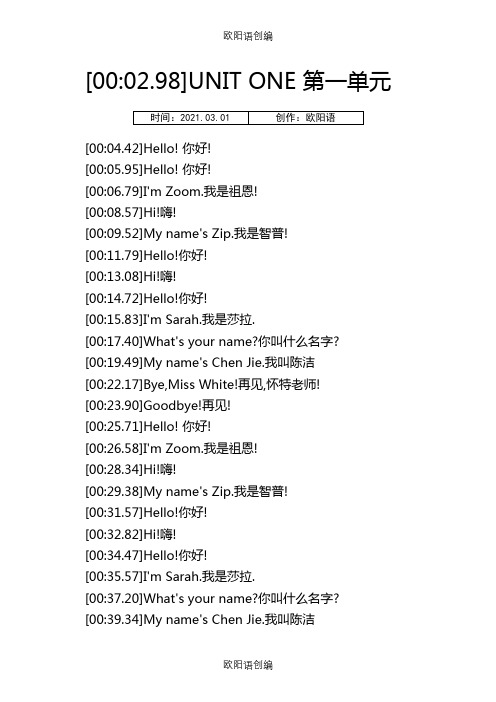
[00:02.98]UNIT ONE 第一单元[00:04.42]Hello! 你好![00:05.95]Hello! 你好![00:06.79]I'm Zoom.我是祖恩![00:08.57]Hi!嗨![00:09.52]My name's Zip.我是智普![00:11.79]Hello!你好![00:13.08]Hi!嗨![00:14.72]Hello!你好![00:15.83]I'm Sarah.我是莎拉.[00:17.40]What's your name?你叫什么名字? [00:19.49]My name's Chen Jie.我叫陈洁[00:22.17]Bye,Miss White!再见,怀特老师![00:23.90]Goodbye!再见![00:25.71]Hello! 你好![00:26.58]I'm Zoom.我是祖恩![00:28.34]Hi!嗨![00:29.38]My name's Zip.我是智普![00:31.57]Hello!你好![00:32.82]Hi!嗨![00:34.47]Hello!你好![00:35.57]I'm Sarah.我是莎拉.[00:37.20]What's your name?你叫什么名字? [00:39.34]My name's Chen Jie.我叫陈洁[00:41.93]Bye,Miss White!再见,怀特老师![00:43.70]Goodbye!再见![00:45.26]A Let's talk谈一谈[00:47.54]Hello!你好!Hi!嗨![00:49.82]Hello!I'm Wu Yifan.你好!我是吴亦帆. [00:51.64]Hi!I'm Sarah.嗨!我是萨拉.[00:53.66]Goodbye!再见![00:55.09]Bye.Miss White!再见,怀特小姐![00:58.28]Let's play[01:00.07]Hi![01:01.56]I'm Bai Ling[01:03.96]Let's learn学一学[01:05.69]pencil铅笔 pen钢笔 ruler尺子[01:09.85]eraser橡皮 crayon蜡笔[01:13.00]Let's do做一做[01:20.40]Show me your pencil.把你的铅笔给我看一看. [01:21.69]Show me your ruler.把你的尺子给我看一看. [01:23.13]Show me your eraser.把你的橡皮给我看一看. [01:24.40]Show me your crayon.把你的蜡笔给我看一看. [01:26.10]Show me your pen.把你的钢笔给我看一看. [01:28.66]Let's make 做一做[01:30.77]Draw yourself.画出自己[01:32.94]Write your name.写上你的名字[01:35.34]Make the holes. 弄两个洞[01:38.52]Thread the string.穿线[01:41.47]Wear the name card.戴上名片[01:44.59]Say your name.说出你的名字. [01:47.50]Hello!你好![01:48.49]I'm Xiao Qiang.我是小强. [01:51.39]Let's sing[01:57.92]Hello,Sarah!do,oh,do.[02:00.41]Hello,John!do,oh,do.[02:03.02]Hello,Mike!do,oh,do.[02:05.60]Hello!Hello!Hello![02:13.42]Hello,Sarah!do,oh,do.[02:15.86]Hello,John!do,oh,do.[02:18.34]Hello,Mike!do,oh,do.[02:20.94]Hello!Hello!Hello![02:24.88][00:02.83]UNIT ONE 第一单元[00:04.30]Hello! 你好![00:05.45]B Let's talk[00:07.76]Hello!I'm Mike.你好!我是迈克. [00:10.44]What's your name?你叫什么名字? [00:12.24]My name's Chen Jie.我叫陈洁. [00:14.61]Bye![00:15.99]See you!再见![00:18.49]Let's play[00:20.48]Hello!你好![00:21.55]What's your name?你叫什么名字? [00:23.91]My name's Sarah.我叫莎拉. [00:26.82]Welcome!欢迎![00:28.90]Let's learn[00:30.51]school学校 bag书包 pencil-case铅笔盒[00:35.01]book书 sharpener铅笔刀[00:38.24]Let's do[00:45.82]Open your pencil-case.打开你的铅笔盒. [00:47.16]Show me your sharpener.把你的铅笔刀给我看一看.[00:48.48]Close your book.合上你的书.[00:49.77]Carry your bag.拿上你的书包.[00:51.22]Go to school.去学校.[00:54.21]Let's check[00:58.00]1.Open the book.打开书.[01:02.36]2.Show me your pencil给我看看你的铅笔. [01:07.34]3.Goodbye Bye.再见.再见.[01:11.83]4.Hello,my name is Mike.你好,我叫迈克. [01:17.42]Let's chant[01:24.97]I have a pencil.Me too![01:27.68]I have a book.Me too![01:30.65]I have a ruler. Me too![01:33.46]I have a bag. Me too![01:36.33]I'm going to school.Me too![01:40.22][ti:wa][00:02.42]UNIT ONE 第一单元[00:03.90]Hello! 你好![00:04.80]C Story time[00:08.61]Hi!Who's there?嗨!谁在那儿?[00:11.05]Guess!猜一猜.[00:12.27]Are you Tutu?你是图图吗? No![00:15.09]Ha!Ha!I'm Zip.哈!哈!我是Zip.[00:17.24]Hi,Zip!My name's Zoom.嗨,Zip!我叫Zoom. [00:20.98]Let's play!OK?我们一起玩,好吗?[00:23.64]Great!太好了![00:25.43]Culture[00:27.35]Happy Teachers' Day! 教师节快乐! [00:30.11]Thank you!谢谢你们![00:31.93]Let's sing[00:38.88]Hello Happy Teacher's Day![00:41.51]Hello Happy Teacher's Day![00:44.03]Hello Hello Miss White![00:46.75]Hello Happy Teacher's Day![00:54.69]Hello Happy Teacher's Day![00:57.18]Hello Happy Teacher's Day![00:59.77]Hello Hello Miss White![01:02.46]Hello Happy Teacher's Day![01:05.09][00:02.70]UNIT 2 第二单元[00:04.36]Look at Me 看着我[00:06.72]Let's play[00:09.25]Hello! 你好![00:10.27]This is my arm.这是我的胳膊.[00:14.27]This is my nose.这是我的鼻子.[00:17.66]Wow!哇![00:19.13]Good morning!早上好![00:21.05]Good morning!早上好![00:23.40]Nice to meet you.见到你很高兴. [00:25.46]Nice to meet you,too.见到你我也很高兴. [00:28.52]Let's play[00:31.07]Hello! 你好![00:32.11]This is my arm.这是我的胳膊.[00:34.75]Hi!嗨![00:36.05]This is my nose.这是我的鼻子.[00:39.43]Wow!哇![00:40.90]Good morning!早上好![00:42.85]Good morning!早上好![00:45.22]Nice to meet you.见到你很高兴. [00:47.28]Nice to meet you,too.见到你我也很高兴. [00:50.54]A Let's talk.[00:53.02]Good morning!早上好![00:54.32]Good morning![00:56.50]Hello!你好!Hi!嗨![00:58.76]This is John.这是约翰.[01:00.30]Nice to meet you.见到你很高兴. [01:01.75]Let's go to school!我们去上学吧! [01:03.35]OK!好的![01:05.26]Let's play[01:07.52]Good morning.早上好.[01:09.06]This is Mr .Yu.这是余先生. [01:12.11]Hello!你好![01:13.75]Nice to meet you.很高兴见到你. [01:16.01]Let's learn.[01:17.75]Look at me.看着我.[01:19.42]This is my head.这是我的头. [01:21.53]This is my ear.这是我的耳朵. [01:23.97]This is my eye.这是我的眼睛. [01:26.16]This is my nose.这是我的鼻子. [01:28.28]This is my face.这是我的脸. [01:30.51]This is my mouth.这是我的嘴巴. [01:33.05]Let's do.[01:40.60]Touch your head.摸摸你的头. [01:42.18]Touch your nose.摸摸你的鼻子. [01:43.59]Touch your eye.摸摸你的眼睛. [01:45.05]Touch your mouth.摸摸你的嘴巴. [01:46.70]Touch your ear.摸摸你的耳朵. [01:48.14]Touch your face.摸摸你的脸. [01:51.14]Let's draw[01:53.49]eye 眼睛[01:55.55]ear 耳朵[01:57.63]nose鼻子[01:59.80]eye 眼睛[02:01.81]ear 耳朵[02:03.71]mouth 嘴巴[02:05.50]Let's sing.[02:11.57]Teddy Bear,Teddy Bear,touch your nose. [02:15.81]Teddy Bear,Teddy Bear,turn around. [02:20.13]Teddy Bear,Teddy Bear,touch your head. [02:24.47]Teddy Bear,Teddy Bear,touch the ground. [02:33.12]Teddy Bear,Teddy Bear,touch your nose. [02:37.36]Teddy Bear,Teddy Bear,turn around. [02:41.80]Teddy Bear,Teddy Bear,touch your head. [02:46.07]Teddy Bear,Teddy Bear,touch the ground. [02:51.16][00:02.46]UNIT TWO 第二单元[00:04.10]Look at Me 看着我[00:05.60]B Let's talk[00:08.14]Hi,Mom!嗨,妈妈![00:09.29]Hi![00:10.67]Mom,this is Mike.妈妈,这是迈克.[00:12.63]Good afternoon,Mike.下午好,迈克. [00:14.56]Good afternoon.下午好.[00:16.38]Nice to meet you.很高兴见到您.[00:18.19]Nice to meet you,too.我也很高心见到你. [00:21.18]Let's play[00:23.23]Good afternoon,Chen Jie.下午好,陈洁. [00:25.55]This is Zoom.我是祖恩.[00:28.37]Hello,Zoom!你好,祖恩![00:30.10]Nice to meet you.很高兴见到你.[00:32.87]Let's learn[00:34.49]Finger手指 body身体 leg腿[00:37.96]foot脚 hand手 arm胳膊[00:41.21]Let's do[00:48.64]Clap your hands 拍拍手[00:49.87]Snap your fingers.捻捻手指.[00:51.43]Wave your arms.挥挥胳膊.[00:52.91]Cross your legs.盘盘腿.[00:54.28]Shake your body.摇摇身体.[00:55.61]Stamp your foot.跺跺脚.[00:58.69]Let's check[01:01.75]1.Touch your nose.摸摸你的鼻子. [01:06.53]2.This is Mike.这是迈克.[01:11.66]3.Let's go to school我们上学去吧. [01:16.96]4.Close your mouth.闭上你的嘴. [01:21.73]Let's chant[01:29.10]Where is your mouth?你的嘴巴在哪儿? [01:30.51]Here it is!在这儿.[01:31.80]Where is your hand?你的手在哪儿? [01:33.11]Here it is![01:34.53]Where is your ear?你的耳朵在哪儿? [01:35.84]Here it is![01:37.35]Where is your nose?你的鼻子在哪儿? [01:38.69]Here it is![01:42.03][00:02.32]UNIT TWO 第二单元[00:03.90]Look at Me 看着我[00:05.25]C Story time[00:08.21]Let's make a puppet.我们做个木偶吧. [00:10.27]Good idea!好主意![00:12.01]First,make the head.首先,我们来做头. [00:14.78]Then,make the body.然后来做身体.[00:17.48]Look!Arms and legs.看,这是胳膊和腿. [00:19.83]Let's play with the puppet.我们来和木偶玩吧. [00:22.23]Oh,no!Don't run away.哦,不!不要跑走. [00:26.28]Culture[00:28.42]Halloween 万圣节[00:30.79]Trick or treat![00:33.89]Happy Halloween! 万圣节快乐![00:37.25]Thank you! 谢谢![00:39.15]Happy Halloween!万圣节快乐![00:41.57]Let's sing.[00:43.86]……[00:50.23][00:02.74]UNIT THREE 第三单元[00:04.13]Let's Paint我们来画画[00:06.42]let's paint! 我们来画画[00:08.76]OK!好的![00:10.64]Hello,Miss White! 你好,怀特老师![00:12.58]How are you?你好吗?[00:15.12]Fine,thank you.很好,谢谢.[00:17.31]How are you?你好吗?[00:19.11]Very well,thanks.非常好,谢谢.[00:21.28]I like blue.我喜欢蓝色.[00:23.48]Me too.我也是.[00:25.90]let's paint! 我们来画画[00:28.34]OK!好的![00:30.18]Hello,Miss White! 你好,怀特老师![00:32.12]How are you?你好吗?[00:34.66]Fine,thank you.很好,谢谢.[00:36.84]How are you?你好吗?[00:38.63]Very well,thanks.非常好,谢谢.[00:40.82]I like blue.我喜欢蓝色.[00:43.07]Me too.我也是.[00:45.88]A Let's talk[00:48.75]Good morning,Miss Green.早上好,格林小姐. [00:50.55]How are you?你好吗?[00:52.16]Fine,thank you.我很好,谢谢.[00:53.47]Mr.Black,this is Miss White.[00:56.37]Nice to meet you.很高兴见到你.[00:58.13]Nice to meet you,too.我也很高兴见到你. [01:01.13]Let's play[01:03.36]Good morning,Sarah.[01:05.43]How are you?[01:07.33]Fine,thank you.[01:10.85]Let's learn[01:12.72]blue蓝色的 green绿色的 yellow黄色的[01:16.74]red 红色的 purple紫色的[01:20.08]Let's do[01:28.29]Show me your red crayon.把你的红色蜡笔给我看.[01:29.66]Show me your blue crayon.把你的蓝色蜡笔给我看.[01:31.16]Show me your green crayon.把你的绿色蜡笔给我看.[01:32.57]Show me your yellow crayon.把你的黄色蜡笔给我看.[01:34.04]Show me purple crayon.把你的紫色蜡笔给看. [01:38.26]Let's paint[01:40.85]Colour the face yellow.把脸画成黄色. [01:44.37]Colour the nose green.把鼻子画成绿色. [01:48.32]Colour the eye blue.把眼睛画成蓝色.[01:52.25]Colour the mouth red.把嘴画成红色.[01:56.15]Colour the ear purple.把耳朵画成紫色. [01:59.66]Let's sing[02:09.96]Who is wearing yellow today?Yellow today? [02:15.80]Yellow today?Who is wearing yellow today? [02:21.63]Who's wearing yellow today?[02:34.13]Who is wearing purple today?Purple today? [02:40.56]Purple today?Who is wearing purple today? [02:46.53]Who is wearing purple today?[02:51.05][00:02.75]UNIT THREE 第三单元[00:04.18]Let's Paint我们来画画[00:05.94]B Let's talk[00:08.64]Hi,Mike!嗨,迈克![00:10.70]Hi,Sarah!How are you?嗨,莎拉!你好吗? [00:13.52]Fine,thanks.我很好,谢谢.[00:14.60]How are you?你好吗?[00:15.79]I'm fine.Thank you.我很好.谢谢.[00:18.44]Let's paint!我们来画画吧![00:20.02]Great!太棒了![00:21.22]Bye,Mom! 妈妈,再见![00:22.40]Bye![00:24.56]Let's Play[00:26.53]Hi,John!嗨,约翰.[00:27.82]How are you?你好吗?[00:29.81]Fine,thank you很好,谢谢你.[00:32.12]Hi,Bai Ling.嗨,白灵.[00:33.96]How are you?你好吗?[00:36.10]Fine.很好.[00:37.20]Hi.嗨[00:39.03]Hi,Mike!嗨,迈克![00:40.68]How are you?你好吗?[00:42.29]Very well,thank.很好,谢谢.[00:45.19]Let's learn[00:47.11]white白色的 pink粉红色的 orange橙色的[00:51.08]brown棕色的 black黑色的[00:54.84]Let's do[01:03.22]Black,black.Stand up.黑色的,黑色的.站起来. [01:06.05]Pink,pink.Sit down.粉红色的,粉红色的.坐下.[01:09.04]Brown,brown.Touch the ground.棕色的,碰一下地.[01:12.00]Orange,orange.Touch your head.橙色的.摸摸你的头.[01:15.05]White,white.Turn around.白色的,白色的.转一圈.[01:20.35]Let's check[01:24.44]1.I like red 我喜欢红色.[01:30.37]2.How are you? 你好吗?[01:36.79]I'm fine,thank you.我很好,谢谢.[01:40.62]3.Show me green 给我看看绿色.[01:46.06]4.Let's paint.OK.我们画画吧.好的.[01:53.45]Let's chant[02:02.35]Pink ball.[02:03.17]Pink ball,purple ball.[02:05.57]Pink ball,purple ball.[02:07.27]Orange ball.[02:08.96]Pink ball,purple ball.[02:10.53]Orange ball,brown ball.[02:13.17]Pink ball,purple ball,[02:14.71]Orange ball,brown ball,[02:16.49]Green ball.[02:20.70]I can see a rainbow!我能看见彩虹![02:23.77]How about you?你呢?[02:25.54][00:02.35]UNIT THREE 第三单元[00:03.68]Let's Paint我们来画画[00:05.24]C Story time[00:07.59]Good morning,Zoom.早上好,Zoom. [00:09.36]Good morning,Zip.早上好,Zip. [00:10.90]How are you,Zip?你好吗,Zip? [00:12.55]Fine,thank you.我很好,谢谢你. [00:14.22]Wow!Flowers!哇!花![00:16.68]A blue flower.一朵蓝色的花. [00:18.32]A red one.一朵红色的花.[00:19.65]A yellow one.一朵黄色的花.[00:21.78]Look!看![00:22.91]Here is your ticket.这是你的票. [00:24.26]Oh no!哦,不![00:27.20]Culture[00:29.07]Look at my flag.看看我的旗. [00:31.71]It's red and white.它是红白相间的. [00:35.04]My flag is red,white and blue. [00:40.20]CAN 加拿大[00:42.15]PRC中国[00:44.22]USA 美国[00:46.24]UK 英国[00:48.32]Let's sing[00:59.22]Red and yellow and pink and green, [01:03.36]Purple and orange and blue. [01:07.87]I can sing a rainbow,sing a rainbow, [01:12.84]Sing a rainbow now.[01:26.11]Red and yellow and pink and green, [01:30.14]Purple and orange and blue.[01:34.91]I can sing a rainbow,sing a rainbow, [01:39.75]Sing a rainbow now.[01:44.26][00:02.53]Recycle 1 Let's act[00:05.87]Hello!Hi![00:08.49]How are you?你好吗?[00:10.10]Fine,thank you.很好,谢谢.[00:11.02]How are you?你好吗?[00:12.70]Very well,thanks.非常好,谢谢.[00:15.12]Good morning!早上好![00:17.43]Good morning.I'm Bai Ling.早上好.我是白灵. [00:19.84]This is Sarah.这是萨拉.[00:21.83]What's your name?你叫什么名字?[00:23.81]I'm Zip.我是Zip.[00:25.29]My name's Zoom.我的名字叫Zoom. [00:27.38]Nice to meet you!很高兴见到你![00:29.56]Nice to meet you,too.我也很高兴见到你. [00:33.02]Hello!你好![00:34.47]Look!Zoom and Zip!看!Zoom和Zip. [00:36.78]Who are you?你是谁?[00:38.86]I'm John.我是约翰.[00:40.83]My name's Mike.我的名字叫迈克.[00:43.38]Bye!Hey![00:46.34]Let's play[00:48.14]Chant and find![00:56.40]What's in the picture?照片里是什么? [00:57.62]Look,look,look![00:59.10]A pencil,a ruler,一只铅笔,一把尺子, [01:00.60]A little red book.一本红色小书. [01:05.03]Pencil-case,sharpener,bag, [01:07.98]Look,look,look![01:10.80]Eraser,crayon,pen,橡皮,蜡笔,钢笔, [01:13.70]And a big blue book.[01:17.92]Chant and colour[01:26.45]Colour this clown,up and down, [01:29.39]Hands pink,ears brown.[01:32.36]Face white,eyes blue,[01:35.41]Hair red,mouth too.[01:41.42]Nose purple,feet grey.[01:44.45]Body orange,hip hooray![01:47.43]Legs black,car yellow,[01:50.33]Happy,happy,happy fellow! [01:57.68]Let's make[01:59.69]Make a funny face[02:02.59]1.Copy and cut...[02:06.12]eyes 眼睛[02:07.37]mouth 嘴巴[02:08.55]nose 鼻子[02:09.80]ears 耳朵[02:11.06]2.Choose and paste.[02:14.97]Let's sing[02:17.40]……[03:08.64][00:02.89]UNIT FOUR[00:04.62]We Love Animals 我们爱护动物[00:08.41]I have a panda.我有一只熊猫.[00:11.22]Look at my rabbit.看我的兔子.[00:14.36]Look at my elephant.看我的大象.[00:17.57]Oh,it's lovely.哦,真可爱.[00:20.17]I like it.我喜欢.[00:21.87]Thank you.谢谢.[00:25.00]I have a duck.我有一只鸭子.[00:28.56]May I have a look?我可以看看吗?[00:31.81]Sure!当然可以.[00:34.19]I have a panda.我有一只熊猫.[00:36.96]Look at my rabbit.看我的兔子.[00:40.09]Look at my elephant.看我的大象.[00:43.31]Oh,it's lovely.哦,真可爱.[00:45.93]I like it.我喜欢.[00:47.99]Thank you.谢谢.[00:50.78]I have a duck.我有一只鸭子.[00:54.27]May I have a look?我可以看看吗?[00:57.51]Sure!当然可以.[00:59.43]A Let's talk[01:02.48]Look!I have a rabbit.看!我有一只小兔子.Cool! [01:06.95]Look!I have a panda!看!我有一只熊猫!Super![01:11.56]Look!I have a monkey.看!我有一只猴子!Great! [01:15.79]Look!I have a zoo.看!我有一个动物园.Wow! [01:20.04]Let's play[01:21.75]Look!看![01:22.97]I have a dog.我有一只狗.[01:25.48]Woof!Woof!汪!汪![01:27.27]Look!看![01:28.24]I have a cat.我有一只猫.[01:31.39]Mew!Mew!喵!喵![01:33.46]Look!看![01:34.54]I have a duck.我有一只鸭子.[01:37.30]Quack!Quack!嘎!嘎![01:39.87]Let's learn[01:41.96]dog小狗 monkey猴子 duck鸭子[01:46.89]panda熊猫 cat小猫 rabbit小兔子[01:52.44]Let's do[02:01.03]Act like a cat.扮演一只小猫.[02:02.53]Act like a duck.扮演一只鸭子.[02:03.99]Act like a panda.扮演一只熊猫.[02:05.43]Act like a monkey.扮演一只猴子[02:07.08]Act like a rabbit.扮演一只小兔子.[02:08.72]Act like a dog.扮演一只小狗.[02:11.41]Let's sing[02:19.70]Old MacDonald had a farm E I E I O.[02:25.66]And on that farm he had some ducks E I E I O.[02:31.75]With a quack quack here and a quack there, [02:35.28]here a quack,there a quack,everywhere a quack.[02:38.58]Old MacDonald had a farm E I E I O.[02:44.85]Old MacDonald had a farm E I E I O.[02:52.16]And on that farm he had some ducks E I E I O.[03:00.04]With a quack quack here and a quack there, [03:04.32]here a quack,there a quack,everywhere a quack.[03:08.38]Old MacDonald had a farm E I E I O.[03:16.26][00:02.47]UNIT FOUR 第四单元[00:04.25]We Love Animals 我们爱护动物[00:06.81]B Let's talk[00:09.84]I have a Teddy Bear.我有一只玩具熊.[00:11.36]Oh,really?哦是真的吗?[00:13.45]May I have a look?我能看一下吗?[00:15.05]Sure.当然可以.[00:16.49]Here you are.给你.。
九年级英语unit14 课文翻译之欧阳语创编
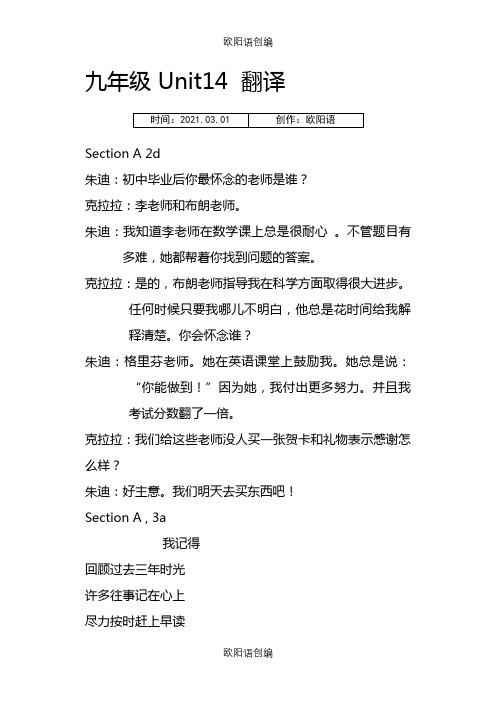
九年级 Unit14 翻译Section A 2d朱迪:初中毕业后你最怀念的老师是谁?克拉拉:李老师和布朗老师。
朱迪:我知道李老师在数学课上总是很耐心。
不管题目有多难,她都帮着你找到问题的答案。
克拉拉:是的,布朗老师指导我在科学方面取得很大进步。
任何时候只要我哪儿不明白,他总是花时间给我解释清楚。
你会怀念谁?朱迪:格里芬老师。
她在英语课堂上鼓励我。
她总是说:“你能做到!”因为她,我付出更多努力。
并且我考试分数翻了一倍。
克拉拉:我们给这些老师没人买一张贺卡和礼物表示感谢怎么样?朱迪:好主意。
我们明天去买东西吧!Section A , 3a我记得回顾过去三年时光许多往事记在心上尽力按时赶上早读午餐铃响跑向食堂记得每年校运会上那些兴奋的点滴事光长时间的运动训练让我克服恐惧,自豪之情充满胸膛仍记得开学的第一天作为班上最害羞的我从不和别人交谈认为自己不会突破这一关但慢慢地我交到了新朋友我把他们铭记在心房互相帮助,完成作业好好学习,一起向上为艺术节做好准备却制造了许多麻烦在新年聚会上玩得尽兴给予大家最好的祝愿我们学了一门不同的语言它来自另外一个国度英语给我们带来许多挑战我们全力以赴,只为将它们征服现在到了毕业的时候我们将离开深爱的母校很难相信,三年时光悄然已过我在尽力让自己保持冷静,不让眼泪洒落忍住不哭是何等的艰难我将思念校园里的一草一木还有那些善良体贴的老师们将变成我美好的回忆,直到永远!·Section B 2b女士们先生们:感谢大家今天来参加第三初级中学的毕业典礼。
首先,我想祝贺在座的所有同学们。
还记得你们刚步入校园开始七年级学习生活时的样子,个个都朝气蓬勃,渴望学习。
当然你们当中的确有些同学难以对付!但是今天,我看到满堂都是有才干的年轻人,对自己的未来充满期望。
你们成长了许多,我为你们感到无比自豪。
虽然在过去三年时光里你们都非常努力学习,但你们都不是单枪匹马作战。
我希望你们记住所有出现在你们生命中的重要人——父母,老师还有朋友,他们都帮助和支持过你们。
高中英语阅读理解翻译100篇之欧阳语创编
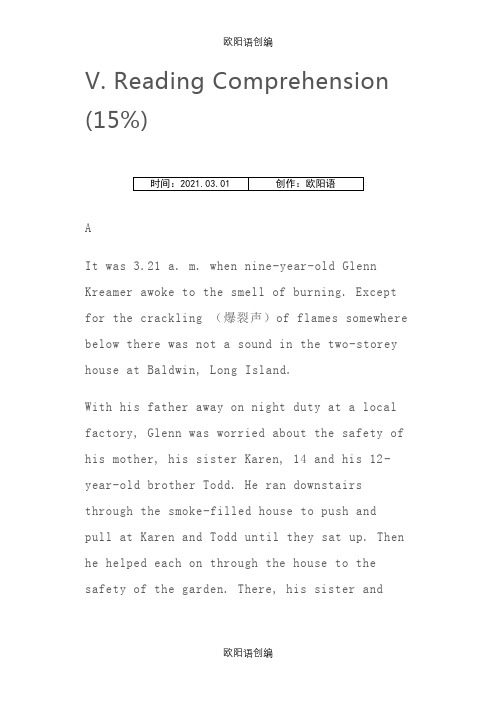
V. Reading Comprehension (15%)AIt was 3.21 a. m. when nine-year-old Glenn Kreamer awoke to the smell of burning. Except for the crackling (爆裂声)of flames somewhere below there was not a sound in the two-storey house at Baldwin, Long Island.With his father away on night duty at a local factory, Glenn was worried about the safety of his mother, his sister Karen, 14 and his 12-year-old brother Todd. He ran downstairs through the smoke-filled house to push andpull at Karen and Todd until they sat up. Then he helped each on through the house to the safety of the garden. There, his sister andbrother, taking short and quick breaths and coughing, collapsed on the lawn.The nine-year-old raced back into the house and upstairs to his mother's room. He found it impossible to wake her up. Mrs. Kreamer, a victim of the smoke, was unconscious, andthere was nobody to help Glenn carry her tothe garden. But the boy remained calm and, as a fireman said later, "acted with all theself-control of a trained adult."On the bedroom telephone, luckily still working, Glenn called his father and, leaving Mr. Kreamer to telephone the fire brigade and ambulance service, got on with the task of saving his mother.First he filled a bucket with water from the bathroom and threw water over his mother and her bed. Then, with a wet cloth around his head he went back to the garden.He could hear the fire engine coming up, but how would the firemen find his mother in the smoke-filled house where flames had almost swallowed up the ground floor?Grasping firmly a ball of string from the garage, Glenn raced back into the house and dashed upstairs to his mother's room. Tying one end of the string to her hand he ran back, laying out the string as he went, through the hall and back out into the garden.Minutes later he was telling fire chief John Coughlan :"The string will lead you to mother." Mrs. Kreamer was carried to safety as the flames were breaking through her bedroom floor.71.Why did Glenn run downstairs first?A.He wanted to find out what was happening. B.He was worried about his mother's safety.C.He wanted to save his sister andbrother. D.He went to see if his father had come back.72.Who called the fire brigade and ambulance service?A.Glenn. B.Glenn's father. C.Glenn's sister. D.Glenn's neighbor.73.What did Glenn do to protect himself?A.He put a wet cloth around his head. B.He threw water all over himself.C.He hid himself in thebathroom. D.He rushed out to the lawn. 74.Glenn saved his family because __________. A.his father had taught him to do so on the phone B.he had learned something about first aidC.he had dealt with the emergency calmly and wisely D.he had followed his mother'sinstructionBThere are three separate sources of danger in supplying energy by nuclear power (原子能).First, the radioactive material must travelfrom its place of production to the power station.Although the power stations themselves are strongly built, the containers used for the transport of the materials are not. Normally, only two methods of transport are in use,namely road or rail, Unfortunately, both of these may have an effect on the general public, since they are sure to pass near, or even through, heavily populated areas.Second, there is the problem of waste. All nuclear power stations produce wastes that in most cases will remain radioactive forthousands of years. It is impossible to make these wastes nonradioactive, and so they must be stored in one of the inconvenient ways that scientists have invented. For example, they may be buried under the ground, or droppedinto deserted mines, or sunk in the sea. However, these methods do not solve the problem, since an earthquake could easilybreak the containers.Third, there may occur the danger of a leak(泄漏) or an explosion at the power station. As with the other two dangers, this is not very likely, so it does not provide a serious objection to the nuclear program. However, it can happen.Separately, these three types of dangers are not a great cause for worry. Taken together, though, the probability of disaster (灾难) is extremely high.75. Which of the following if FALSE?A. It is possible that a leak or an explosion occurs at a power station.B. It is unusual for radioactive materials to be transported across land.C. The containers are likely to be broken by an earthquake.D. Nuclear wastes remain dangerous in most cases for many years.76. The author thinks that the ways to store nuclear wastes are .A. easyB.impossible C.reasonable D. ineffective77. What do we learn from the last paragraph?A. The power station is a safe place.B. The dangers of nuclear energy can be prevented.C. The general public are strongly against the nuclear program.D. By itself, none of the three dangers is very likely to cause much worry.78. What is this passage about?A. Uses of nuclear power.B. Dangers from nuclear power.C. Public anger at nuclear power.D. Accidents caused by nuclear power.CThere is one foreign product the Japanese are buying faster faster than others,and its popularity has caused an uneasy feeling among many Japanese.That product is foreign words.Gairaigo-words that comefrom outside have been part of the Japanese language forcenturies. Mostly borrowed from English and Chiease.These terms are often changed into formsno longer understood by native speakers.But in the last few years the trickle(涓涓细流)of foreign words has become a flood,and people fear the increasing use of foreign words is making it hard for the Japanese to understand each other and could lead to many people forgetting the good qualities of traditional(传统的) Japanese.“The popularity of forgign words is part of the Japanese interest inanything,”saysuniversity lecturer and writer TakashiSai to.“By using a foreign word you can make a subjectseem new,which makes it easier for the medias(媒体)to pick up.”“Experts(专家)often study abroad and use English terms when they speak with people intheir own fields. Those terms are then included in government white papers,”said MuturoKai,president of the National Language Research Institute.“Foreign words find their wayeasily into announcements made to the general public,when they should really be explained inJapanese.”Against the flow of new words,many Japanese are turning back to the study of their ownlanguage.Saito's Japanese to Be Read Aloud is one of many language books that are now flying off book sellers' shelves.“We were experting to sell the books to young people,” said the writer,“but it turnsout they are more popular with the older generation who seem uneasy about the future of Japanese.”79. What advantages do foreign words have over traditional Japanese terms?A. The idea sexpressed in foreign words sound new.B. Foreign words are best suited for announcements.C. Foreign words make new subject seasier to understand.D. The use of foreign words makes the media more popular.80.IntheopinionofTakashiSaito,Japanesepeople_____.A. are good at learning foreign languagesB. Are willing to learn about new thingsC. trust the mediaD. respect experts81. Which of the following plays an important part in the spread of foreign words?A. The media and govemment papersB. Best-selling Japanese textbooks.C. The interest of young Japenese.D. Foreign products and experts82. The book Japanese to Be read Aloud____.A. sells very well in JapanB. is supported by the governmentC. is questioned by the old generationD. causes misunderstanding among the readers.DPlanet HunterWhen Geoff Marcy was 14, his parents bought him a telescope. Every night, he would go onto the roof outside his window to see the wonders of the sky.“What excited me most was whether there were planets(行星)in other solar(太阳的)systems where li fe might exist, ”he says. “I decided to try to find planets orbiting(沿…轨道运行)other stars like our Sun.”And he did. “My fellow researcher, Paul Butler, and I found our first planet in1995, ”Dr. Marcy says. “We worked for ten years without finding anything! But we stuck with it, and our patience paid off. ”Since then, the two scientists have discovered 65 of the more than 100 planets found orbiting other stars. Dr. Marcy and Dr. Butler also spotted the first “family”ofthree planets. In June 2002 they announced another discovery: a Jupiter-like(像木星一样的)planet orbiting star 55 Cancri.At first, the two researchers found only planets that orbit close to stars. Recently, the scientists found planets farther out. The planet orbiting 55 Cancri is a major breakthrough: it is the first sighting of a large gas planet about the same distance from the star as Jupiter is from the Sun.Why is this important? Scientists think that life on Earth may exist because of two special features(特征)in our solar system. The first is Jupiter.“Because it’s so big, Jupiter pulls comets and asteroids(小行星), or they all come and hit the Earth. ”Dr. Marcy explains.“Without Jupiter, life on Earth would likely have been destroyed. ”A second feature is that Earth is arocky planet where liquid water, which is necessary for life, can exist. Unlike gas planets, rocky planets like Earth havesurfaces where water can gather in pools and seas, which may support life. A huge space exists between the Jupiter-like planet and two other planets that lie close to 55 Cancri. Is there an Earth-like planet in the space, too small for us to notice? If so, says Dr. Marcy, “We would have two striking similarities to our solar system: a Jupiter-like planet and an Earth-like planet. And t here may be life! ”83. What can we learn about Dr. Marcy from the passage?A. He is fond of watching Jupiter.B. He is from a scientist family.C. He dislikes working with PaulButler. D. He is interested in finding life in outer space.84. How many planets orbiting other stars have the two scientists discovered so far?A. 100B. 69C. 66D. 6585. “But we stuck with it”(in Paragraph 3)means ______.A. they felt discouragedB. they carried on with itC. they failed in their attemptD. they made some progressVII. Translation (15%)1. 你离家前一定要把灯关掉。
时态句子翻译练习之欧阳语创编
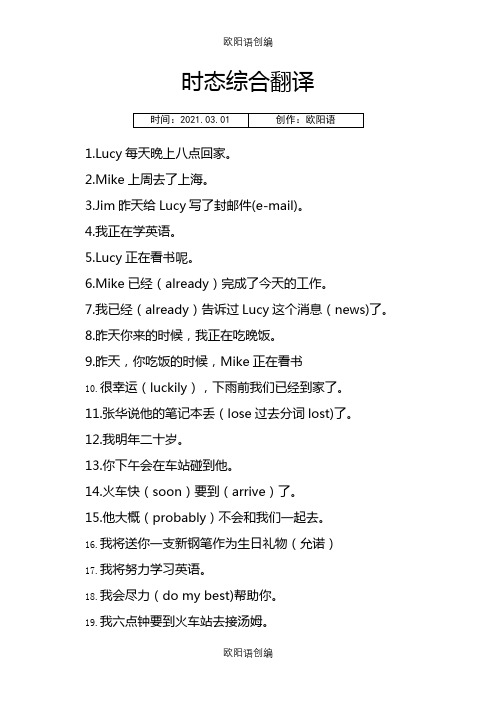
时态综合翻译1.Lucy每天晚上八点回家。
2.Mike上周去了上海。
3.Jim昨天给Lucy写了封邮件(e-mail)。
4.我正在学英语。
5.Lucy正在看书呢。
6.Mike已经(already)完成了今天的工作。
7.我已经(already)告诉过Lucy这个消息(news)了。
8.昨天你来的时候,我正在吃晚饭。
9.昨天,你吃饭的时候,Mike正在看书10.很幸运(luckily),下雨前我们已经到家了。
11.张华说他的笔记本丢(lose过去分词lost)了。
12.我明年二十岁。
13.你下午会在车站碰到他。
14.火车快(soon)要到(arrive)了。
15.他大概(probably)不会和我们一起去。
16.我将送你一支新钢笔作为生日礼物(允诺)17.我将努力学习英语。
18.我会尽力(do my best)帮助你。
19.我六点钟要到火车站去接汤姆。
20.你什么时候完成你的工作?21.看这些乌云(black clouds)要下雨了。
22.我看(think)要下雪。
23.恐怕(I'm afraid)我要得重感冒(have a bad cold)。
24.到上月底他们已经挣了两千五百万美元了。
25.电影已经开始几分钟了他才到电影院。
26.他们已经(already)答复(answer)了我们的信。
27.他昨天晚上离开这里到(leave for)上海去了。
28.我上中学的时候总是六点钟起床。
29.昨天这个时候,我们正在上英语课。
30.我们吃饭的时候,灯灭了(go out)。
31.我母亲做饭的时候(while),我父亲在抽烟。
32.她给你打电话的时候,你在干什么?33.孩子们正在高兴地玩。
34.孩子们正在唱歌。
35.太阳正从东方升起(rise)。
36会议将在九点钟开始。
37.她后天来这里。
38牛奶要变质(go bad)了。
39.我会给你一个惊喜(surprise)。
40.奶奶经常给我讲故事。
41.汤姆昨天起晚了。
英语句子翻译练习(附答案)之欧阳法创编
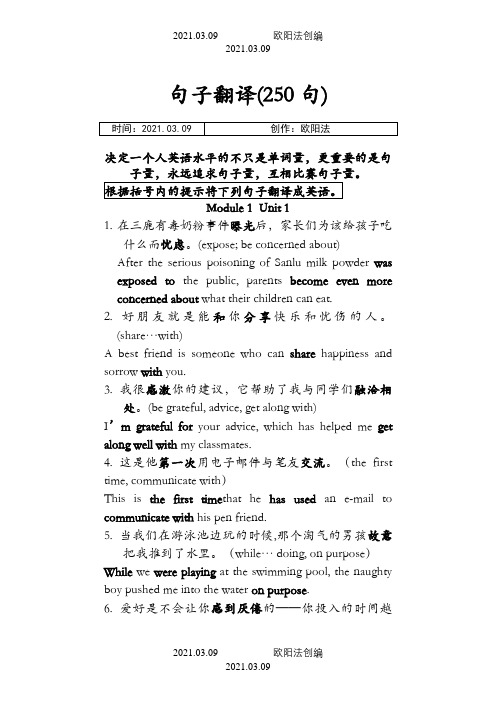
句子翻译(250句)决定一个人英语水平的不只是单词量,更重要的是句1. 在三鹿有毒奶粉事件曝光后,家长们为该给孩子吃什么而忧虑。
(expose; be concerned about)After the serious poisoning of Sanlu milk powder was exposed to the public, parents become even more concerned about what their children can eat.2. 好朋友就是能和你分享快乐和忧伤的人。
(share…with)A best friend is someone who can share happiness and sorrow with you.3. 我很感激你的建议,它帮助了我与同学们融洽相处。
(be grateful, advice, get along with)I’m grateful for your advice, which has helped me get along well with my classmates.4. 这是他第一次用电子邮件与笔友交流。
(the first time, communicate with)This is the first time that he has used an e-mail to communicate with his pen friend.5. 当我们在游泳池边玩的时候,那个淘气的男孩故意把我推到了水里。
(while… doing, on purpose)While we were playing at the swimming pool, the naughty boy pushed me into the water on purpose.6. 爱好是不会让你感到厌倦的——你投入的时间越长,乐趣越多(the more… the more; devote to; get tired of). A hobby is something that you never get tired of—the more time you devote to it, the more fun you will have.7.计算机使人们即使身处世界的不同角落也能面对面地交流, 这彻底改变了我们的生活。
it was+ 一段时间+since还是before从句之欧阳语创编
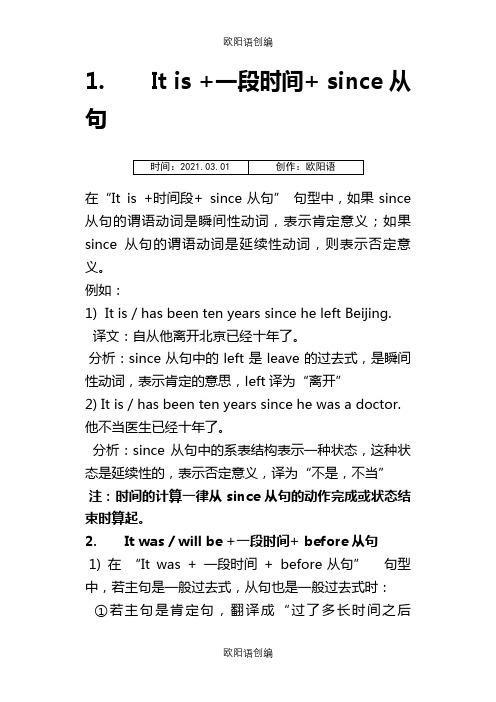
1. It is +一段时间+ since从句在“It is +时间段+ since从句” 句型中,如果since 从句的谓语动词是瞬间性动词,表示肯定意义;如果since从句的谓语动词是延续性动词,则表示否定意义。
例如:1) It is / has been ten years since he left Beijing.译文:自从他离开北京已经十年了。
分析:since从句中的left是leave的过去式,是瞬间性动词,表示肯定的意思,left译为“离开”2) It is / has been ten years since he was a doctor. 他不当医生已经十年了。
分析:since从句中的系表结构表示一种状态,这种状态是延续性的,表示否定意义,译为“不是,不当”注:时间的计算一律从since从句的动作完成或状态结束时算起。
2. It was / will be +一段时间+ before从句1) 在“It was + 一段时间+ before从句” 句型中,若主句是一般过去式,从句也是一般过去式时:①若主句是肯定句,翻译成“过了多长时间之后才……”例:It was long before they found their son. 过了很久他们才找到他们的儿子。
②若主句是否定形式,翻译成“没过多久就……”例:It was not long before the couple met again. 没过多久这对夫妻就见面了。
2) 在“It will be + 一段时间+ before从句”句型中,若主句是一般将来时,从句也是一般现在时:①若主句是肯定句,翻译成“要过多长时间之后才……”例: It will be half a year before I come back. 半年后,我才回来。
②若主句是否定形式,翻译成“用不了多久就……”例:It won’t be long before we meet again.我们不久就会见面。
七年级英语句型转换1-100附答案之欧阳歌谷创作
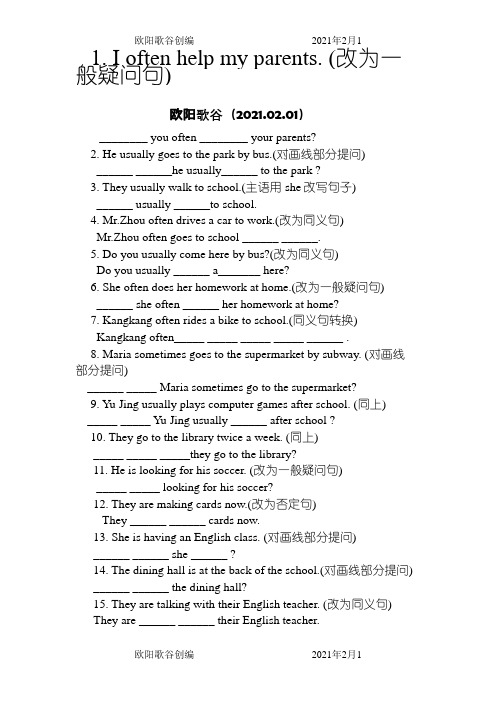
1. I often help my parents. (改为一般疑问句)欧阳歌谷(2021.02.01)________ you often ________ your parents?2. He usually goes to the park by bus.(对画线部分提问)______ ______he usually______ to the park ?3. They usually walk to school.(主语用she改写句子)______ usually ______to school.4. Mr.Zhou often drives a car to work.(改为同义句)Mr.Zhou often goes to school ______ ______.5. Do you usually come here by bus?(改为同义句)Do you usually ______ a_______ here?6. She often does her homework at home.(改为一般疑问句)______ she often ______ her homework at home?7. Kangkang often rides a bike to school.(同义句转换)Kangkang often_____ _____ _____ _____ ______ .8. Maria sometimes goes to the supermarket by subway. (对画线部分提问)______ _____ Maria sometimes go to the supermarket?9. Yu Jing usually plays computer games after school. (同上)_____ _____ Yu Jing usually ______ after school ?10. They go to the library twice a week. (同上)_____ _____ _____they go to the library?11. He is looking for his soccer. (改为一般疑问句)_____ _____ looking for his soccer?12. They are making cards now.(改为否定句)They ______ ______ cards now.13. She is having an English class. (对画线部分提问)______ ______ she ______ ?14. The dining hall is at the back of the school.(对画线部分提问)______ ______ the dining hall?15. They are talking with their English teacher. (改为同义句)They are ______ ______ their English teacher.16. I want to work in China because I love China and its people. (对画线部分提问)______ ______you want to work in China?17. It’s Tuesday to day. (对画线部分提问)______ ______ is it today?18. The class is over at eleven o’clock. (对画线部分提问)______ ______ ______ the class over?19. We are having an English class. (对画线部分提问)______ ______ are you having?20. They have seven lessons every day. (对画线部分提问)______ ______ lessons do they have every day?21. There is a picture on the wall. (改为否定句)______ ______ a picture on the wall.22. She is making a cake. (对画线部分提问)______ is she ______?23 . There is a boy in the room.(改为复数形式)There _____ _____ _____ in the room.24. Tom has some books. (改为一般疑问句)_____ Tom _____ _____ books ?25. The classroom is mine. (改为同义句)This _____ _____ classroom .26. There are seven days in a week. (对画线部分提问)_____ _____ days are there in a week?27. My shoes are under the bed. (对画线部分提问)_____ _____ your shoes ?28. There are some books and a pen in my desk. (改为一般疑问句)_____ there _____books and a pen in my desk?29. Why don’t you go to school by bus? (改为同义句)_____ ____ go to school by bus?30. There is a book on the table near the window. (对画线部分提问)_____ on the table near the window?31. There is a T-shirt in the living room. (对画线部分提问)_____ _____ in the living room ?32. There are some computers in our school. (改为否定句)There _____ _____ computers in our school.33. Is your study on the first floor?(用the second floor改写为选择疑问句)_____ your study on the first floor ____ on the second floor?34. My books are on the shelf. (对画线部分提问)_____ _____ your books ?35. Lan Lan is very glad to help others. (改为同义句)Lan Lan _____ very _____ to help others.36. There is an old man in the room. (改为复数形式)There _____ _____ _____ _____ in the room.37. There is some meat on the plate. (改为否定句)There _____ _____ _____ on the plate.38. There is a map of Beijing on the wall. (改为一般疑问句,并作肯定回答)--____ ____ a map of Beijing on the wall .--____, ____ ____.39. There are thirteen trees behind the house. (对画线部分提问)_____ _____ trees _____ _____ behind the house?40. There’s an app le on the table. (对画线部分提问)______ on the table?41. There is something wrong with the piano. (改为同义句)The piano _____ _______ .42. What’s the matter with you? (改为同义句)______ ______ with you ?43. There are some books in the bookstore. (改为否定句)There ______ ______ books in the bookstore.44. My mother goes to see my grandma per week. (对画线部分提问)______ ______ ______ your mother ______ to see your grandma ?45. There is no house near the garden. (改为同义句)There ______ ______ ______ house near the garden.46. Zhou Jun will go to bed after she finishes her homework. (同上) Zhou Jun _____ _____ to bed _____ she finishes her homework.47. Mr. Zhang takes a bus to work. (改为同义句)Mr. Zhang goes to work ______ ______.48. Excuse me, how can I get to the hotel? (改为同义句)Excuse me, which is ______ ______ ______ the hotel?49. My home is about five kilometers from here. (对画线部分提问) _____ _____ is your home from here?50. There is some milk in the cup. (改为否定句)There ______ ______ milk in the cup.51. There is an old building near my school. (改为复数形式)There _____ _____ old _____ near my school.52. Take the second turning on the right. (改为同义句)______ ______ at the second turning .53. Put them away, please. (改为否定句)______ ______ them here, please.54. Where is the supermarket? (改为同义句)______ can I _____ ______ the supermarket?55. There are many public phones in the street. (对画线部分提问) ______ ______ in the street ?56. She has four classes every morning. (改为否定句)She _____ ______ four classes every morning .57. I go to the library three times a week. (对画线部分提问)______ ______ do you go to the library ?58. There are two boats on the river. (对画线部分提问)______ ______ boats are there on the river?59. Maria is reading in the library. (对画线部分提问)______ is Maria _______ in the library?60. Excuse me, which is the way to the bookstore? (改为同义句)Excuse me, hoe can I _____ _____ the bookstore?61. We go home by subway. (改为同义句)We _______ the subway to go home .62. They usually go to the library on foot. (改为同义句)They usually _______ ________ the library .63. What about this picture? (改为同义句)_______ _______ this picture ?64. Mary goes to work in a car. (改为同义句)Mary _______ _______ _______ to go to work .65. How many times a week do you play football? (改为同义句)________ ________ do you play football ?66. Tom and Mike are sleeping in their dormitory. (改为一般疑问句) __________________________________________________ 67. Kangkang is playing football with his friends. (对画线部分提问) __________________________________________________ 68. He reads English after class. (用now 代替after class改换时态)__________________________________________________ 69. Would you like to go home tomorrow? (用want改为同义句)__________________________________________________ 70. Please give my book back to me on time. (用return改为同义句) __________________________________________________71. I like stories very much. (改为否定句)I _______ like stories _______ _______ .72. Those buses are yellow. (对画线部分提问)________ ________ are those buses ?73. She plays the guitar every day because she thinks it’s very interest ing. (对画线部分提问)________ ________ she play the guitar every day ?74. What do you think of English? (改为同义句)_______ do you _______ English ?75. What time is school over in the afternoon? (改为同义句)_______ does school _______ in the afternoon ?76. They’re having a music class. (对画线部分提问)______ class ______ they having ?77. The men sometimes come here by train. (改为同义句)The men sometimes come here _______ _______ _______ . 78. She looks at his new photos. (改为否定句)She ______ ______ at his new photos .79. He usually goes to Beijing by sea. (对画线部分提问)_______ _______ he usually go to Beijing ?80. do, go, how, home, holidays, you, for, your, usually (连词成句) ________________________________________________81. My bedroom is next to my study. (对画线部分提问)_______ _______ _______ bedroom ?82. There are some apples on the table. (改为一般疑问句)_______ _______ _______ apples on the table ?83. Why not go to the study? (改为同义句)_______ _______ ________ go to the study ?84. Is there a yellow car near your house? (作否定回答)_______, _______ _______ .85. She gets a letter from her mother every week. (改为同义句) She _______ _______ her mother every week .86. What’s wrong with your bike? (改为同义句)What’s ______ _______ with your bike ?87. My neighbors are quiet. (对画线部分提问)______ are your neighbors ________ ?88. The supermarket is next to the bank. (同上)_______ _______ the supermarket ?89. There are some children in the park. (改为否定句)There _______ ________ children in the park .90. Would you like to go shopping with me? (改为同义句)_______ you _______ to go shopping with me ?91. Thank you anyway. (同上)Thank you _______ _______ _______ .92. Take the first turning on the left. (同上)_________ _________ at the first turning .93. My office is on the first street. (对画线部分提问)________ ________ _______ office ?94. Open your eyes, please. (改为否定句)________ _______ your eyes, please .95. There are some old men here. (改为单数形式)_______ _______ ________ old man here .96. There are some teachers in the teachers’ room. (改为否定句)There _______ _______ teacher s in the teachers’ room .97. Put it on the shelf. (改为否定句)_______ _______ it on the shelf .98. ----What time is it? ----It’s 9:45. (改为同义句)----What time is it? ----It’s a ________ _______ 10 .99. Why don’t you go there by bus? (改为同义句)Why ________ go there by bus ?100. I usually go to school by bike. (对画线部分提问)______ _______ you usually go to school ?参考答案:1.Do;help2.How does; go3.She;walk4.by car5.take;bu s6.Does;do7.go to school by bike8.How does9.What doe s;do10.How often do 11.Is he 12.aren’t making 13.What is;do ing14.Where is 15.talking to 16.Why do 17.What day18.What time is 19.What class 20.How many 21.There i sn’t22.What;doing 23.are some boys 24.Does;have any 25.is my26.How many 27.Where are 28.Are;any 29.Why not30.What’s 31.What is 32.aren’t any 33.Is;or34.Where are 35.Is;pleased 36.are some old men 37.isn’t a ny meat 38.Is there;Yes,there is 39.How many;are there40.What’s 41.doesn’t work 42.What’s wrong 43.aren’t a ny44.How often does;go 45.is not any 46.won’t go;until47.by bus 48.the way to 49.How far 50.isn’t any51.are some;buildings 52.Turn right 53.Don’t put 54.Ho w;get to55.What is 56.doesn’t have 57.How often 58.How man y59.What;doing 60.get to 61.take 62.walk to 63.How about 64.drives a car 65.How often 66.Are Tom and Mike sl eeping in their domitory? 67.What is Kangkang doing with his fri ends? 68.He is reading English now. 69.Do you want to go ho me tomorrow?70.Please return my book to me on time. 71.don’t;at all 72. What color 73.Why does 74.How;like 75.When; end76.What; are 77.in a train 78.doesn’t look 79.How doe s80.How do you usually go home for your holidays? 81.Where is your82.Are there any 83.Why don’t you 84.No,there isn’t85.hears from 86.the matter 87.What; like 88.Where is89.aren’t any 90.Do; want 91.all the same 92.Turn left93.Where is your 94.Don’t open 95.There i s an96.aren’t any 97.Don’t put 98.quarter to 99.not 100.How do。
中考英语句子翻译精选89题之欧阳文创编
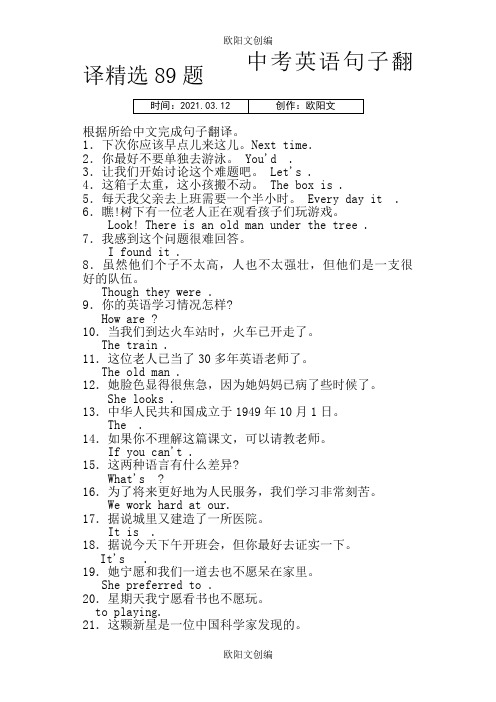
中考英语句子翻译精选89题根据所给中文完成句子翻译。
1.下次你应该早点儿来这儿。
Next time.2.你最好不要单独去游泳。
You'd .3.让我们开始讨论这个难题吧。
Let's .4.这箱子太重,这小孩搬不动。
The box is .5.每天我父亲去上班需要一个半小时。
Every day it . 6.瞧!树下有一位老人正在观看孩子们玩游戏。
Look! There is an old man under the tree .7.我感到这个问题很难回答。
I found it .8.虽然他们个子不太高,人也不太强壮,但他们是一支很好的队伍。
Though they were .9.你的英语学习情况怎样?How are ?10.当我们到达火车站时,火车已开走了。
The train .11.这位老人已当了30多年英语老师了。
The old man .12.她脸色显得很焦急,因为她妈妈已病了些时候了。
She looks .13.中华人民共和国成立于1949年10月1日。
The .14.如果你不理解这篇课文,可以请教老师。
If you can't .15.这两种语言有什么差异?What's ?16.为了将来更好地为人民服务,我们学习非常刻苦。
We work hard at our.17.据说城里又建造了一所医院。
It is .18.据说今天下午开班会,但你最好去证实一下。
It's .19.她宁愿和我们一道去也不愿呆在家里。
She preferred to .20.星期天我宁愿看书也不愿玩。
to playing.21.这颗新星是一位中国科学家发现的。
The new star.22.他给我们提供了一条有用的信息。
He gave us .23.请立刻给我带两瓶牛奶来吧。
Please at once.24.你们最好不要在大街上踢足球。
You'd better . 25.他已被派到西藏(Tibet)工作去了吗7in Tibet?26.教育上已取得了很大的成绩。
PEP小学四年级英语下册课文翻译之欧阳语创编
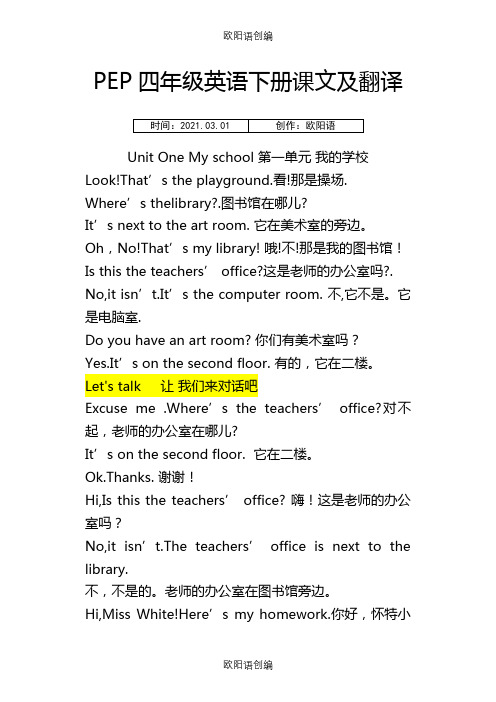
PEP四年级英语下册课文及翻译Unit One My school 第一单元我的学校Look!That’s the playground.看!那是操场. Where’s thelibrary?.图书馆在哪儿?It’s next to the art room. 它在美术室的旁边。
Oh,No!That’s my library! 哦!不!那是我的图书馆!Is this the teachers’ office?这是老师的办公室吗?. No,it is n’t.It’s the computer room. 不,它不是。
它是电脑室.Do you have an art room? 你们有美术室吗?Yes.It’s on the second floor. 有的,它在二楼。
Let's talk 让我们来对话吧Excuse me .Where’s the teachers’ office?对不起,老师的办公室在哪儿?It’s on the second floor. 它在二楼。
Ok.Thanks. 谢谢!Hi,Is this the teachers’ office? 嗨!这是老师的办公室吗?No,it isn’t.The teachers’ office is next to the library.不,不是的。
老师的办公室在图书馆旁边。
Hi,Miss White!Here’s my homework.你好,怀特小姐!这是我的家庭作业。
Thank you, Mike.谢谢你,麦克。
Bye,Miss White.再见,怀特小姐。
Look,ask and answerWhere’s the library? 图书馆在哪里?It’s on the second floor. 它在二楼。
Is it next to classroom 3? 它是在三班的旁边吗?Yes,it is. 是的。
Let's learnWhere’s the library?【teachers’ office】图书馆在哪里?/老师的办公室It’s on the first floor.【second floor】它在一楼。
很棒很爽口的英语口语06月12日星期五.txt之欧阳语创编
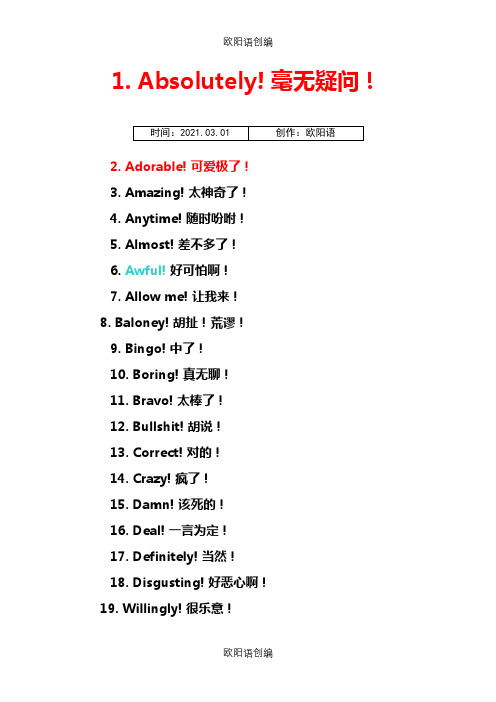
1. Absolutely! 毫无疑问!2. Adorable! 可爱极了!3. Amazing! 太神奇了!4. Anytime! 随时吩咐!5. Almost! 差不多了!6. Awful!好可怕啊!7. Allow me! 让我来!8. Baloney! 胡扯!荒谬!9. Bingo! 中了!10. Boring! 真无聊!11. Bravo! 太棒了!12. Bullshit! 胡说!13. Correct! 对的!14. Crazy! 疯了!15. Damn! 该死的!16. Deal! 一言为定!17. Definitely! 当然!18. Disgusting! 好恶心啊!19. Willingly! 很乐意!20. Exactly! 完全正确!21. Well? 怎么样?22. Fantastic! 妙极了!23. Fifty-fifty! 一半对一半!(半斤八两)24. Fresh! 好有型!帅极了!25. Gorgeous! 美极了!26. Great! 太好了!27. Hopefully! 希望如此!28. Horrible! 好可怕!29. Hot! 好辣!30. Hurray! / Hurrah! 万岁!31. Imagine! 想想看!32. Impossible! 不可能吧!33. Impressive! 很感人,永生难忘!34. Incredible! 不可思议!35. Indeed? 真的?36. Listen! 听着!37. Lousy! 差劲!38. Now! 现在就做!39. Objection! 我抗议!40. Outrageous! 不得了!41. Perfect! 很完美!42. Please! 拜托了!43. Probably! 很可能!44. Rats! 差劲!45. Relax! 放轻松!46. Right! 对的!47. Satisfied? 满意了吗?48. So so. 马马虎虎!49. Still? 仍是这样?50. Stingy! 小气鬼!51. Superb! 棒极了!52. Surprise! 给你一个惊喜!53. Terrible! 好可怕!54. Terrific! 了不起的!55. Try! 去试一下!56. Unbelievable! 难以置信!57. Understand? 明不明白?汉语有中四个字的成语,可以言简意赅的表达丰富的含义。
- 1、下载文档前请自行甄别文档内容的完整性,平台不提供额外的编辑、内容补充、找答案等附加服务。
- 2、"仅部分预览"的文档,不可在线预览部分如存在完整性等问题,可反馈申请退款(可完整预览的文档不适用该条件!)。
- 3、如文档侵犯您的权益,请联系客服反馈,我们会尽快为您处理(人工客服工作时间:9:00-18:30)。
句子翻译(250句)决定一个人英语水平的不只是单词量,更重要的是句子量,Module 1 Unit 11. 在三鹿有毒奶粉事件曝光后,家长们为该给孩子吃什么而忧虑。
(expose; be concerned about)After the serious poisoning of Sanlu milk powder was exposed to the public, parents become even more concerned about what their children can eat.2. 好朋友就是能和你分享快乐和忧伤的人。
(share…with)A best friend is someone who can share happiness and sorrow with you.3. 我很感激你的建议,它帮助了我与同学们融洽相处。
(begrateful, advice, get along with)I’m grateful for your advice, which has helped me get along well with my classmates.4. 这是他第一次用电子邮件与笔友交流。
(the first time, communicate with)This is the first time that he has used an e-mail to communicate with his pen friend.5. 当我们在游泳池边玩的时候,那个淘气的男孩故意把我推到了水里。
(while… doing, on purpose)While we were playing at the swimming pool, the naughty boy pushed me into the water on purpose.6. 爱好是不会让你感到厌倦的——你投入的时间越长,乐趣越多(the more… the more; devote to; get tired of).A hobby is something that you never get tired of—the more time you devote to it, the more fun you will have.7.计算机使人们即使身处世界的不同角落也能面对面地交流,这彻底改变了我们的生活。
(make …possible; face to face; even if;entirely)Computer makes it possible for people to talk face to face even if they are in different parts of the world, which has entirely changed our life.8. 每当考试遇到很多难题的时候,我首先告诉自己要平静下来。
(a series of, calm down)Every time I met witha series of difficult problems in the exam, the firststep I took was to ask myself to calm down.9.根据新闻报道,是天气决定神舟七号发射的准确时间。
(according to, it is ….that强调句 )According to the news report, it is the weather that will determine the exact launch time of Shenzou Seven.10. 为了实现他的冠军梦,他在过去十年里经历了许多的艰辛。
(in order to, suffer)In order to realize his dream of being a champion, he has suffered great hardship over the past ten years.Module 1 Unit21.现在,每年有超过100万的旅客来广州观光旅游. (at present, more than)At present,more than one million visitors / tourists travel to Guangzhou every year.2. 他们的友谊是建立在多年相互开放沟通的基础上的.(base… on, communication)Their relationship is based upon years of open communication with each other.3. 我们要充分利用我们现有的资源. (make use of, resources)We must make good use of the resources we have now.4. 我们应该积极参加社区服务. 这样可以丰富我们的生活. (take part in, enrich)We should take an active part in community service, which can enrich our life.5. 不管你相不相信, 我们已经逐渐地可以用英语流利地表达自己了。
(believe it or not, gradually, express, fluently)Believe it or not, we have gradually become able to express ourselves fluently in English.6. 实际上学好英语有很多种方式, 例如多背诵, 多看书.(actually, a number of, such as)Actually, there are a number of ways to learn English well, such as by recitation and reading.7. 即使这工作要花掉我六个星期的时间,我仍决心要完成这份工作。
(even if, determined )Even if it takes me six weeks, I am determined to finish the job.8. 由于下大雨,到处都出现了交通阻塞。
(because of) Because of the heavy rain, there are traffic jams everywhere.9. 政府应该尽快想出更好的办法来解决高油价所带来的问题. (come up with, petrol)The government should come up with a better solution to the problems caused by the high price of petrol.10. 全体同学都要准时参加明天举行的会议. (request) Allstudents are requested to attend the meeting to be held tomorrow and to get there on time.Module 1 Unit 31.杰克给了我一个坚定的眼神,这眼神表明他不会改变主意,也不会屈服。
(determined, change one’s mind, give in)Jack gave me a determined look, which showed methat he would neither change his mind nor give in 2. 约翰,想办法把这房间整理好。
(think of, get sth done) John, think of ways to get this room tidied up.3. 他不停劝说我,如果我去旅游,让他相陪。
(persuade, company)He kept persuading me to take him for company if I went for a trip.4. 尽管她并不喜欢画,她却坚持要和我一起去看画展。
(befond of, insist)Although she was not fond of paintings, she insisted that she (should) go to the exhibition with me.5. 花了一周时间才把衣物和药品送达灾区。
(transport运输)It took one week to transport the food, clothes and medicine to the disaster-hit area.6. 我们以为保罗是一个可信赖的人,但实际上他只关心他自己。
(reliable, care about)We thought that Paul was a reliable man, but actually he only cares about himself.7. 首先想到沿着河流从源头到终点骑车旅游的是你的表姐。
(强调句)It was your cousin who first had the idea to cycle along the river from where it begins to where it ends.8. 由于他的车损坏了,他获得了1000元的保险费。
(insurance)Because his car was damaged,he received RMB1000 from the insurance company.9. 我妹妹很固执,她根本听不进别人的意见。
(stubborn) So stubborn is m y sister that she won’t listen to any suggestion.10. 请耐心点。
火车十分钟后到。
(be doing 表将来) Please be patient. The train is arriving in ten minutes.Module 1 Unit 41. 好像他的事业就快要结束了。
(It seems/ seemed that…, at an end)It seems that his career is at an end.2. 据报道,我们市吸烟人数已达到100万。
(It is reportedthat…, the number of, reach)It is reported that the number of smokers in our city has reached one million.3. 我想知道这些幸存者是如何被营救的。
